Ján Figeľ and András Sajó open the 24th Annual International Law and Religion Symposium
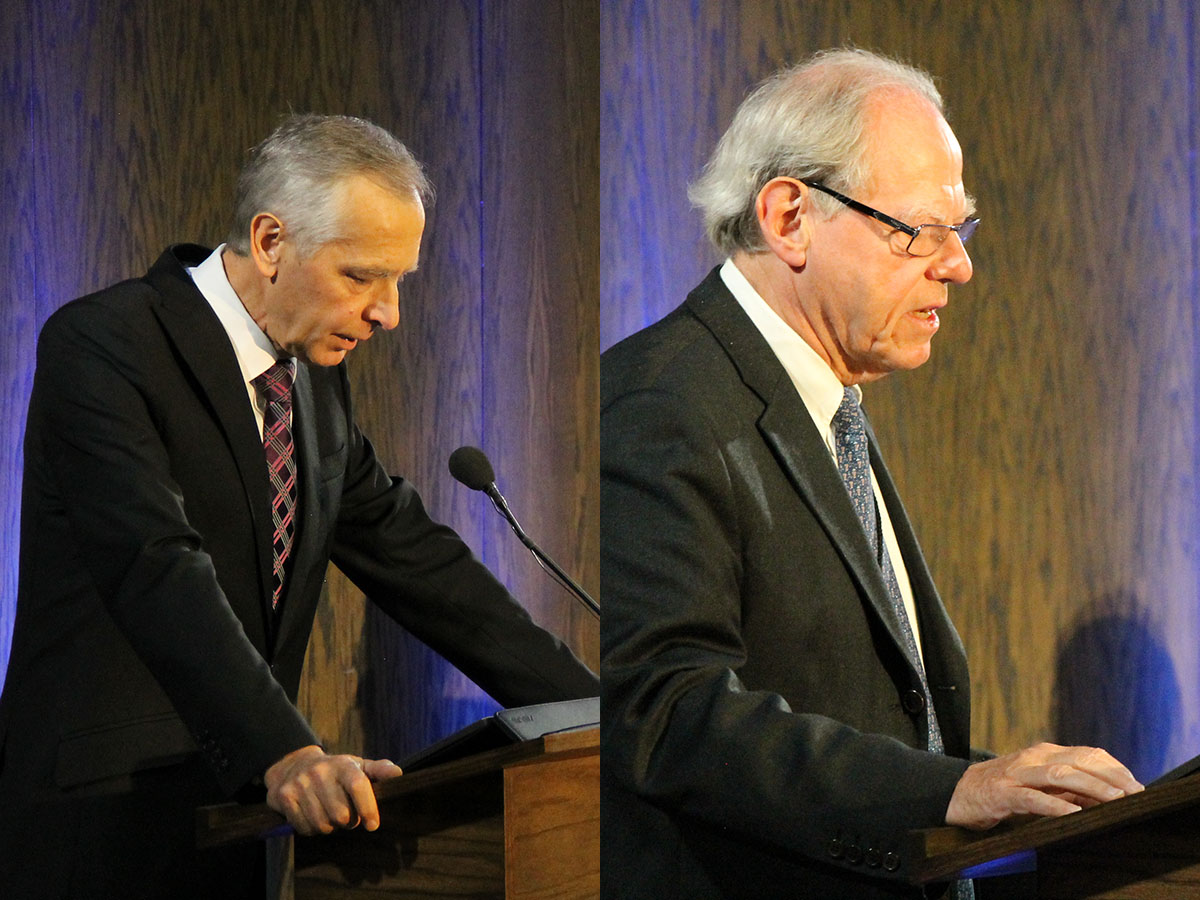
by Melissa Hartman, BYU Law Student and Symposium Volunteer
Two distinguished Keynote speakers addressed participants from around the world assembled for the opening session of the 24th Annual International Law and Religion Symposium. In addition to an address by Ján Figeľ, Special Envoy for the Promotion of Freedom of Religion or Belief Outside the European Union, those assembled at the J. Reuben Clark Law School and participants via webcast, were privileged to hear from András Sajó, Former Judge and Vice-President of the European Court of Human Rights.
The opening session commenced with the Director of the International Center for Law and Religion Studies, Brett G. Sharffs welcoming attendees and inviting them to reflect on the role religion can play in building peace, stability, and harmony or alternatively contributing to disunity and violence. BYU President Kevin J. Worthen, and Dean of the J. Reuben Clark Law School, Gordon Smith, then also welcomed…
Symposium 2017: First Plenary: Religion and Security in a Changing World
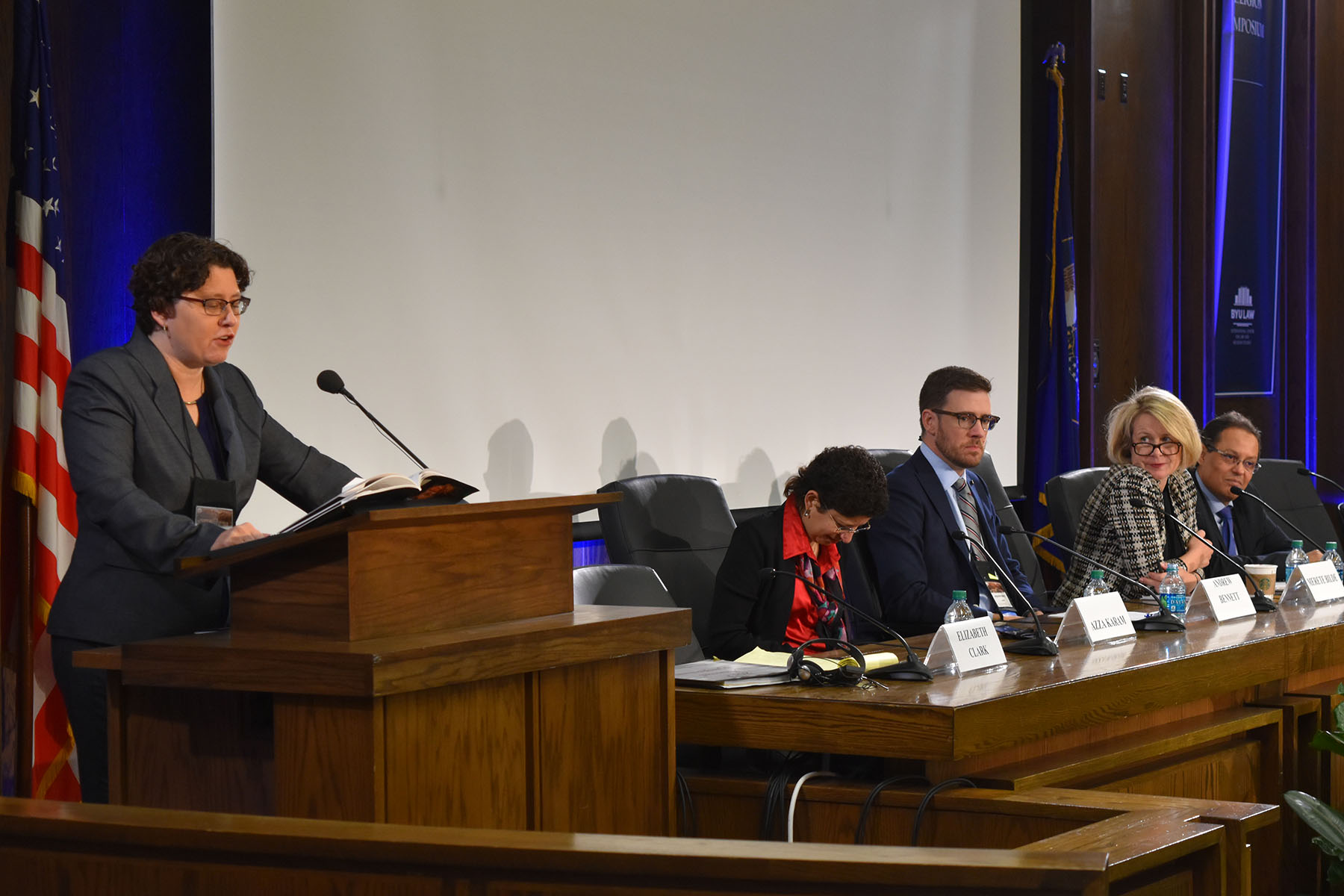
by Alexander Alton, BYU Law Student and Symposium Volunteer
The first plenary session, held Monday October 2, 2017 and moderated by Professor Elizabeth Clark, focused on religion and security in a changing world. The session included four speakers: Azza Karam, Senior Advisor on Culture at the United Nations Population Fund and Coordinator of the U.N. Inter-Agency Task Force on Religion and Development; Andrew Bennett, Senior Fellow and Chair in the Cabinet of Canadians and former Ambassador of Religious Freedom for Canada; Merete Bilde, Policy Advisor for the European External Action Service in European Union; and Khalid Hajji, Secretary General of the European Council of Moroccan Ulema.
Professor Clark opened the session by observing a moment of silence for the victims of the Las Vegas attack on October 1, 2017. Ms. Karam then spoke about…
Symposium 2017: Faith Perspectives and Interfaith Relations in a Changing World
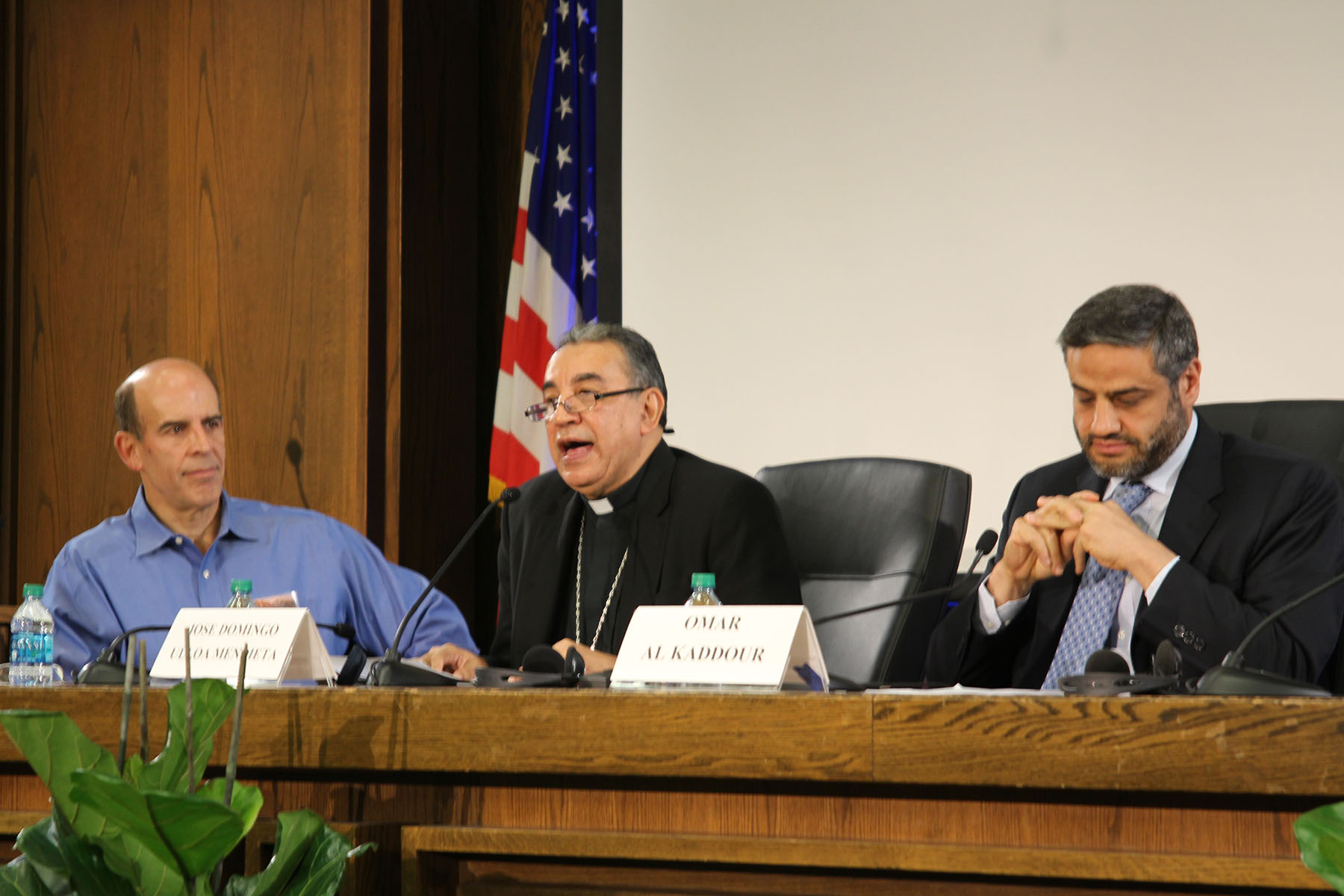
by Thomas Palmer, BYU Law Student and Symposium Volunteer
The Monday morning session, Faith Perspectives and Interfaith Relations in a Changing World, was moderated by Grant Underwood, Professor in the Department of History and Richard L. Evans Chair of Interreligious Understanding at Brigham Young University. Panelists were Archbishop José Ulloa Mendieta of the Archdioces of Panama, and Omar Al Kaddour, Director of Religious Freedom and Diversity, Argentinian Ministry of Foreign Affairs and Worship.
Archbishop Ulloa Mendieta
“We live not just in an era of change, but in the changing of an era.” The Archbishop discussed his dream that in this new era, religious freedom will in reality be a right for everyone. This is done by finding common ground and working towards that common ground. People are sometimes pessimistic and they feel like they cannot change society. Good societies are built upon the foundation of the family. The Archbishop invited us to focus on helping our youth to develop good values, and especially to promote the value of families. To this end, Panama will host the Jornada Mundial de la Juventud in 2019. The Archbishop explained more about the importance of this event and invited all to participate. The Archbishop also gave a summary of the state of law and religion in Panama.
Omar Al Kaddour
Mr. Al Kaddour discussed the long history of peaceful coexistence of Argentina among different religious groups. Religious freedom in Argentina is respected as a universal human right. The countries with the best coexistence of faiths avoid conflict and resolve disputes in the best way possible. We live in a polarized generation where fundamentalists and fanatics seem to be winning the battle. The values that inspired the French Revolution and modernity are in a terminal crisis. Liberty and equality and the abandonment of fraternity have left men empty, incomplete, and isolated and we see a lot of need—just look to the current refugee crisis.
Mr. Al Kaddour shared his vision of how to revitalize humanity: from within religion we can contribute with creativity to give birth to this doctrine of fraternity or brotherhood. A society living in fraternity also has solidarity. Like the Pope said, fraternity allows all people to be diverse. Fraternity allows people that are the same in their dignity and in human rights to participate and work together.
Liberty, fraternity, and equality can give an answer to the needs of men to give them purpose and let them live freely. Together they can do good for man and separately they lead to existential emptiness. This cannot be imposed by a revolution. Mr. Al Kaddoour said we are striving to create an Argentina that establishes these values and allows each citizen to have a place at the table to share bread together, and to reach their material and spiritual potential.
Symposium 2017: Religion and Security in a Changing World: Latin America
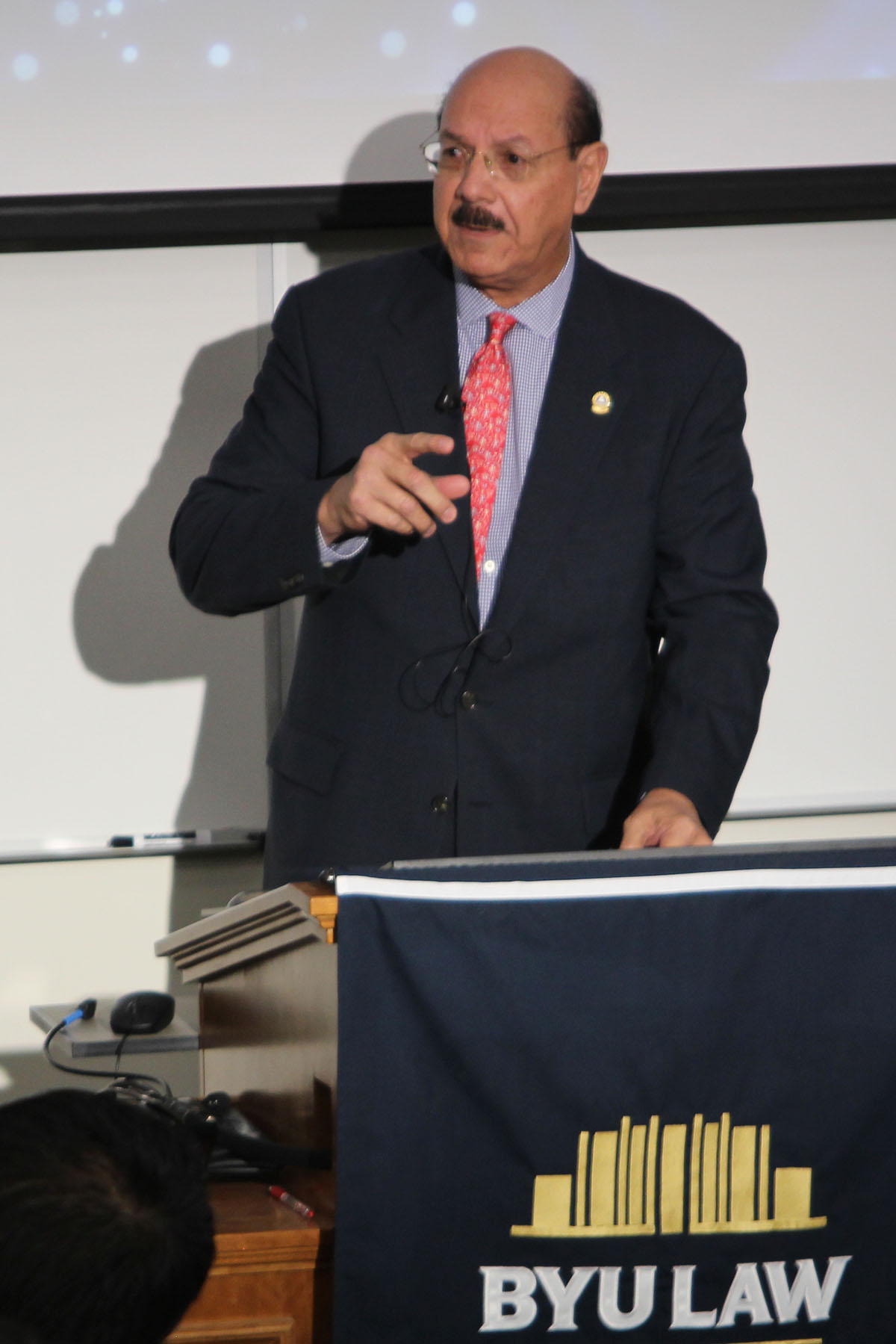
by Alexander Alton, BYU Law Student and Symposium Volunteer
The breakout session entitled Religion and Security in a Changing World: Latin America was held on Monday, October 2, 2017 and moderated by Professor Gary B. Doxey, Associate Director of the International Center for Law and Religion Studies. The session featured presentations by Jose Antonio Alvarado Correa, a member of Central American Parliament, Guatemala; Silvio Mora Mora, the Ambassador of Nicaragua in Guatemala; Raquel Caballero de Guevara, Attorney General for the Defense of Human Rights in El Salvador; and Manuel Ignacio Acosta Gutiérrez, Mayor of Hermosillo, Mexico.
Mr. Correa expounded on the need to do more in Guatemala to involve political leaders in discussions about religious freedom if we want to protect this fundamental right. He explained that having peace is not only the absence of conflict—complete peace includes tolerance that we can all…
Symposium 2017: International Promotion of Religious Freedom
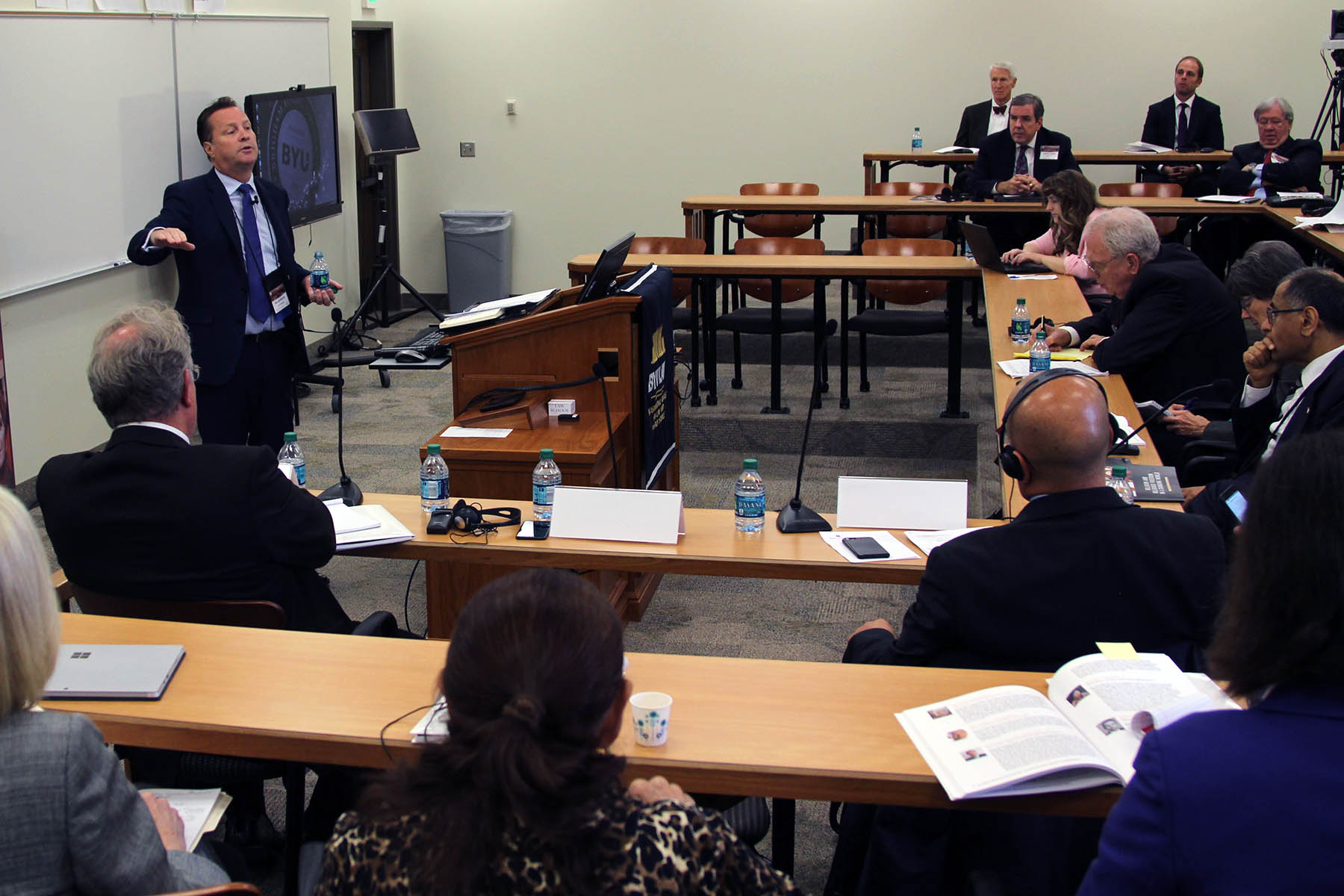
by Melissa Hartman, BYU Law Student and Symposium Volunteer
The International Promotion of Religious Freedom breakout session was held on Monday October 2, 2017 and moderated by David M. Kirkham, Academic Director of the BYU London Centre and Senior Fellow of the International Center for Law and Religion Studies. It included panelists Phil Sherwood and Luigi Lacquanti.
Phil Sherwood of the United Kingdom is the Vice President of the AMAR International Charitable Foundation. His message focused primarily on the gap between ambitious rhetoric on religious freedom and the practical actions required to ensure it on a daily basis. Sherwood drew on his experience working in Iraq to illustrate…
Symposium 2017: Religion and Security in a Changing World: Judicial Perspectives (Monday morning session)
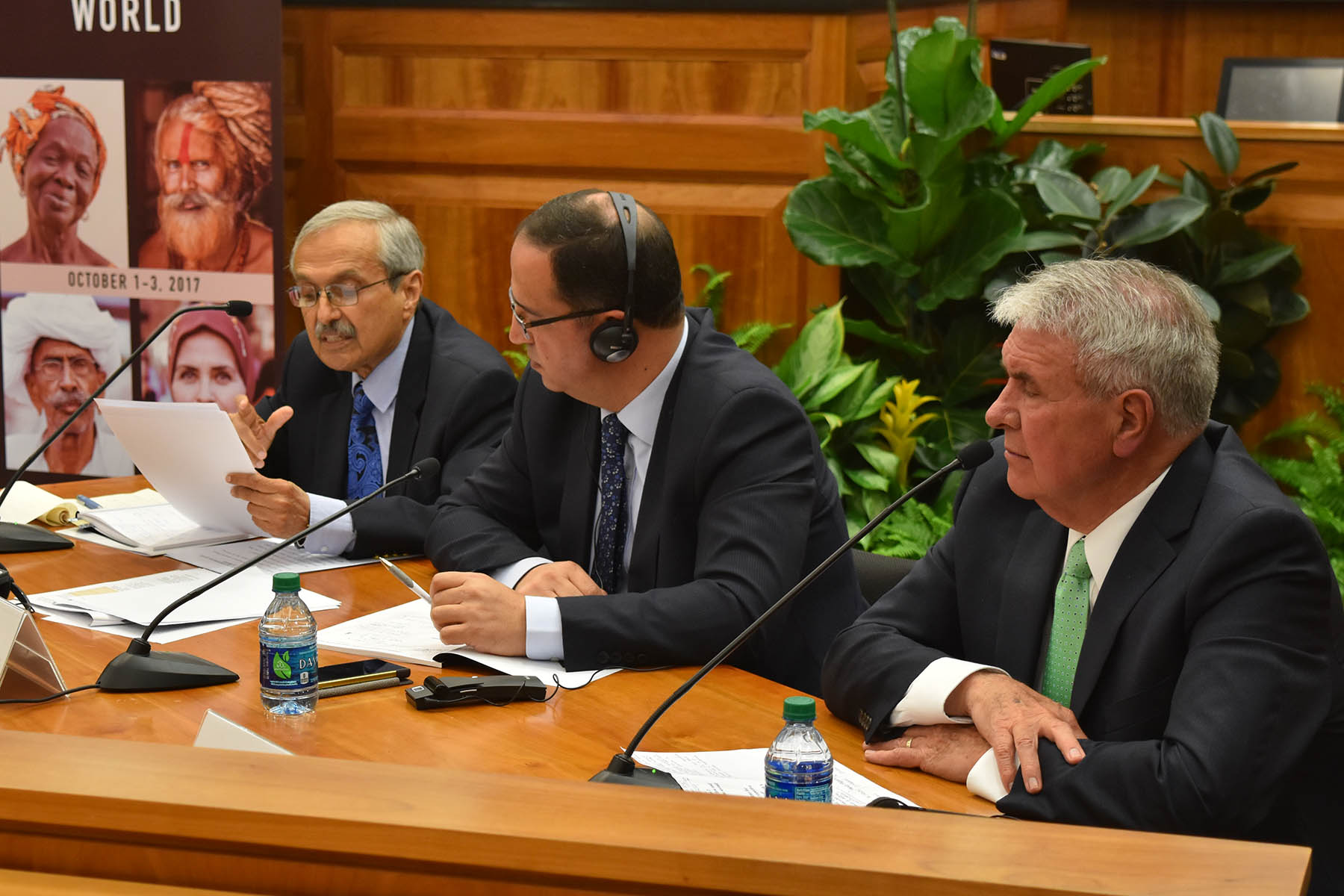
by Jordan Pendergrass, Editorial Associate
On the first full day of the 24th Annual International Law and Religion Symposium, multiple breakout sessions were dedicated to the topic of religion and security. One such session was dedicated to the judicial perspective. The moderator was Roger Hunt, a federal judge from Nevada, USA, and the panelists included five distinguished judges whose jurisdictions span the globe: Peter Toliken of Papua New Guinea, Carl Singh of Guyana, Ahmed Ebrahim of Zimbabwe, and Khalifeh Khaled Musa Al-Suleiman and Thaer Al-Adwan of Jordan.
All five judges validated a position that was held in the Symposium’s plenary meeting held just minutes earlier: religiosity does not give rise to security concerns in every country. Each country represented–Papua New Guinea, Guyana, Zimbabwe, and Jordan–was described as being free of serious threats by religious actors. Most judges conceded that religious friction can and has existed between private individuals and, on occasion, religious groups; however, the judges’ respective governments are pleased overall with the harmony in which various religionists live. And when private actors do violate the rights of religious people, the judges explained, there is an appropriate response by government authorities.
A common element between the presenters was the legal framework that allows minorities to exist and flourish in their respective countries. These robust religious freedom protections allow for positive expression and participation by minorities, which prevents disenfranchisement and suppression. In Guyana, the government recognizes both Muslim and Hindu holidays, indigenous people enjoy protections under the law, and no one religion is promoted by the state over another. Papua New Guinea, perhaps the most diverse country on earth, successfully accommodates religious diversity–despite its constitution acknowledging the country’s Christian heritage, traditional faiths are recognized and valued. Jordan, despite being surrounded by intense conflict, ensures that different religions practice their faiths freely and takes great effort to prevent discrimination and promote the peaceful coexistence of religions. Zimbabwe recognizes that it faces major problems in the areas of corruption, management, and the economy, but, religious strife is not counted among its problems. Following the examples of the United States and India, the constitutional protection of religious freedom prevents interference in religious affairs in Zimbabwe.
Symposium 2017: Laos People’s Democratic Republic
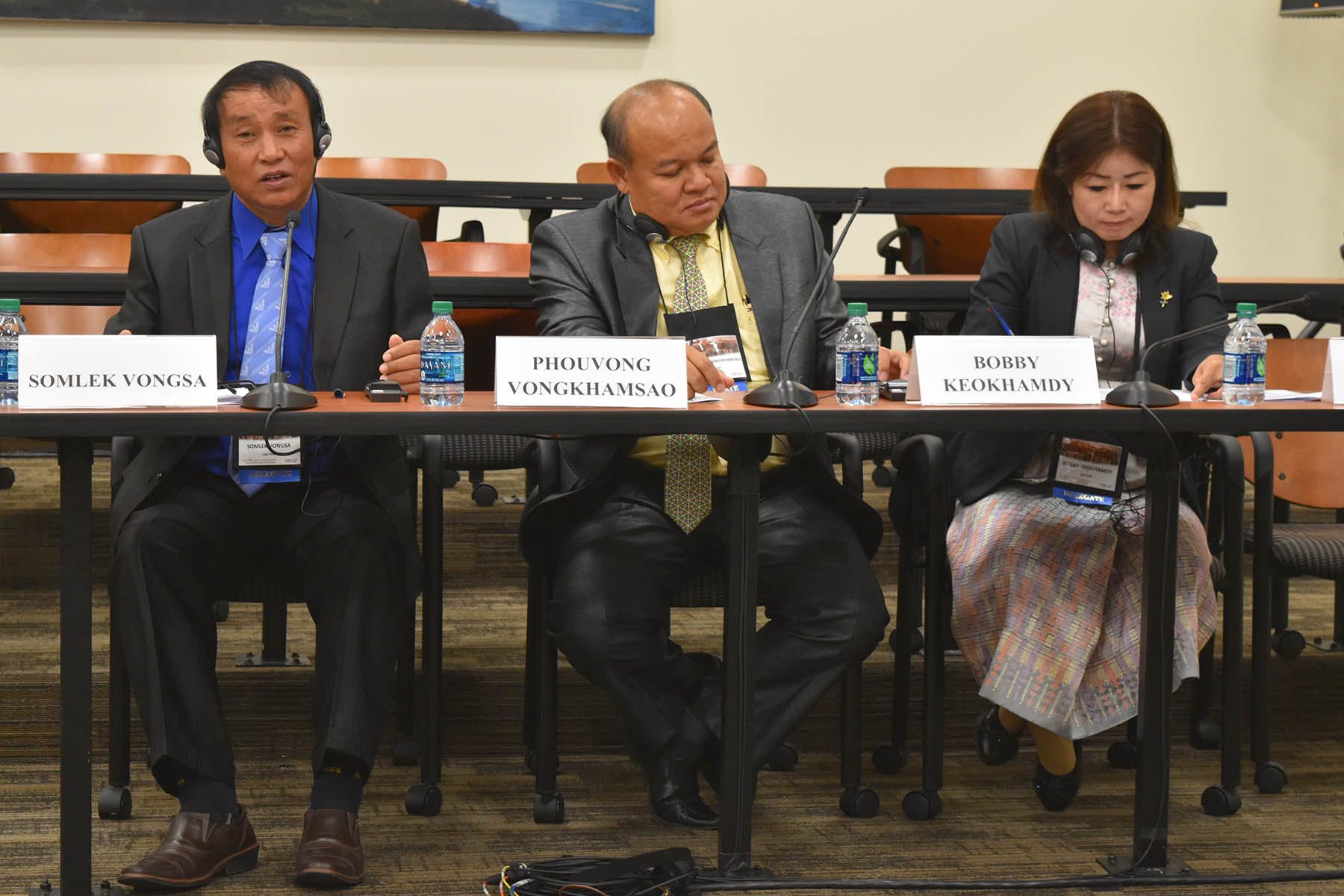
by Shaun Belliston, BYU Law Student and Symposium Volunteer
The breakout session on Lao People’s Democratic Republic was held Monday morning on October 2, 2017, and was translated into several languages. The session was moderated by Steven L. Toronto, International Fellow for the International Center for Law and Religion Studies. Mr. Toronto welcomed the audience and introduced the delegates from Laos PDR. The delegates consisted of Somlek Vongsa, Phouvong Vongkhamsao, and Bobby Keokhamdy.
The first speaker of the session was Somlek Vongsa, Deputy Director of the Department of Home Affairs of Vientiane, the capital of Laos PDR. Mr. Vongsa began his remarks by thanking the University for hosting the event and the attendees for their interest in religious freedom. All religions must be considered equal before the law and no believer or non-believer should be forced to worship contrary to their own beliefs, Mr. Vongsa expressed. For these reasons, Mr. Vongsa continued, Laos PDR must have laws and regulations to prohibit religious coercion.
The second speaker of the session was Phouvong Vongkhamsao, Chief of the Cabinet of Vientiane, the capital city of Laos PDR. Mr. Vongkhamsao oversees the rights and freedoms of religion and the relationship between the government and religion. Mr. Vongkhamsao began his remarks by discussing the ethnic diversity of Laos PDR and the progression of religious freedom. Previously, Mr. Vongkhamsao said, religious rights were very limited in Laos PDR, allowing only 2 religions to be registered with the state; however, now there are 4 registered religions, including Buddhism, Christianity, Islam, and Baha’i. Mr. Vongkhamsao also explained some of the laws governing religious freedom in Laos PDR, including Decree 92. Among other things, Decree 92 compels religious groups to uphold the laws and regulations of the nation and prohibits religious organizations from coercing citizens into joining through bribery or force.
Mr. Toronto then opened the session up for Q&A. At the close of the Q&A, Mr. Jackson thanked the speakers for their dedication and scholarship and for their time in addressing the symposium.
Symposium 2017: Second Plenary: Religion and Pluralism in a Changing World
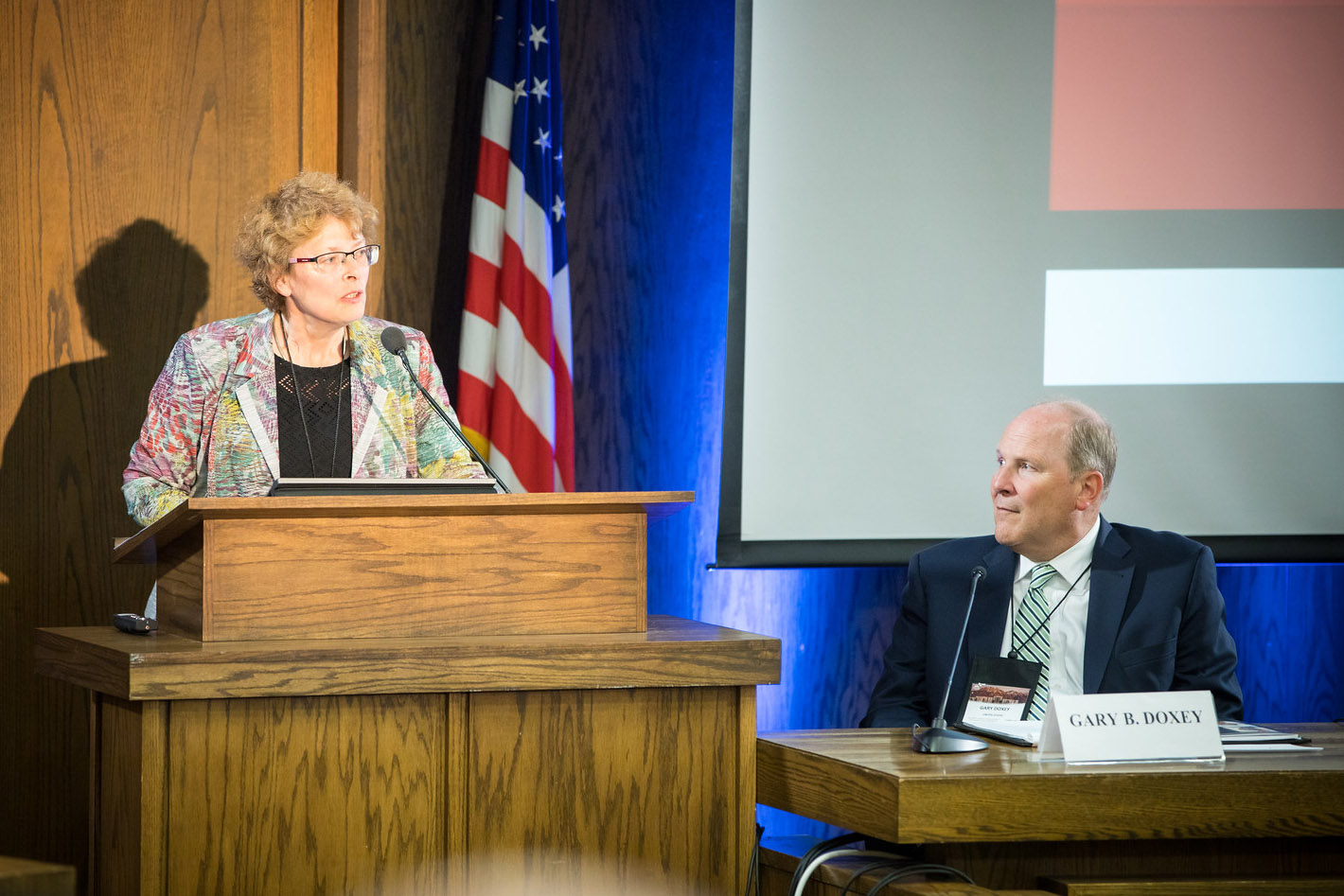
by Kyle Harvey, BYU Law Student and Symposium Volunteer
A panel of four distinguished speakers addressed the symposium during the second plenary session – a session dedicated to Religion and Pluralism in a changing world. The session was moderated by Gary Doxey, Associate Director of the Center.
Professor Sophie van Bijsterveld of Radboud University spearheaded the presentations and discussed issues of religious freedom as they pertain to national identity and the re-culturization of religion, including emphasis on how political leaders have historically and currently interacted with the concepts of religion and secularism.
Professor Grace Davie of the University of Exeter was the second of the four speakers. Professor Davie presented information regarding her valuable contribution to an international panel for social progress…
Symposium 2017: Faith Perspectives on Religion in a Changing World
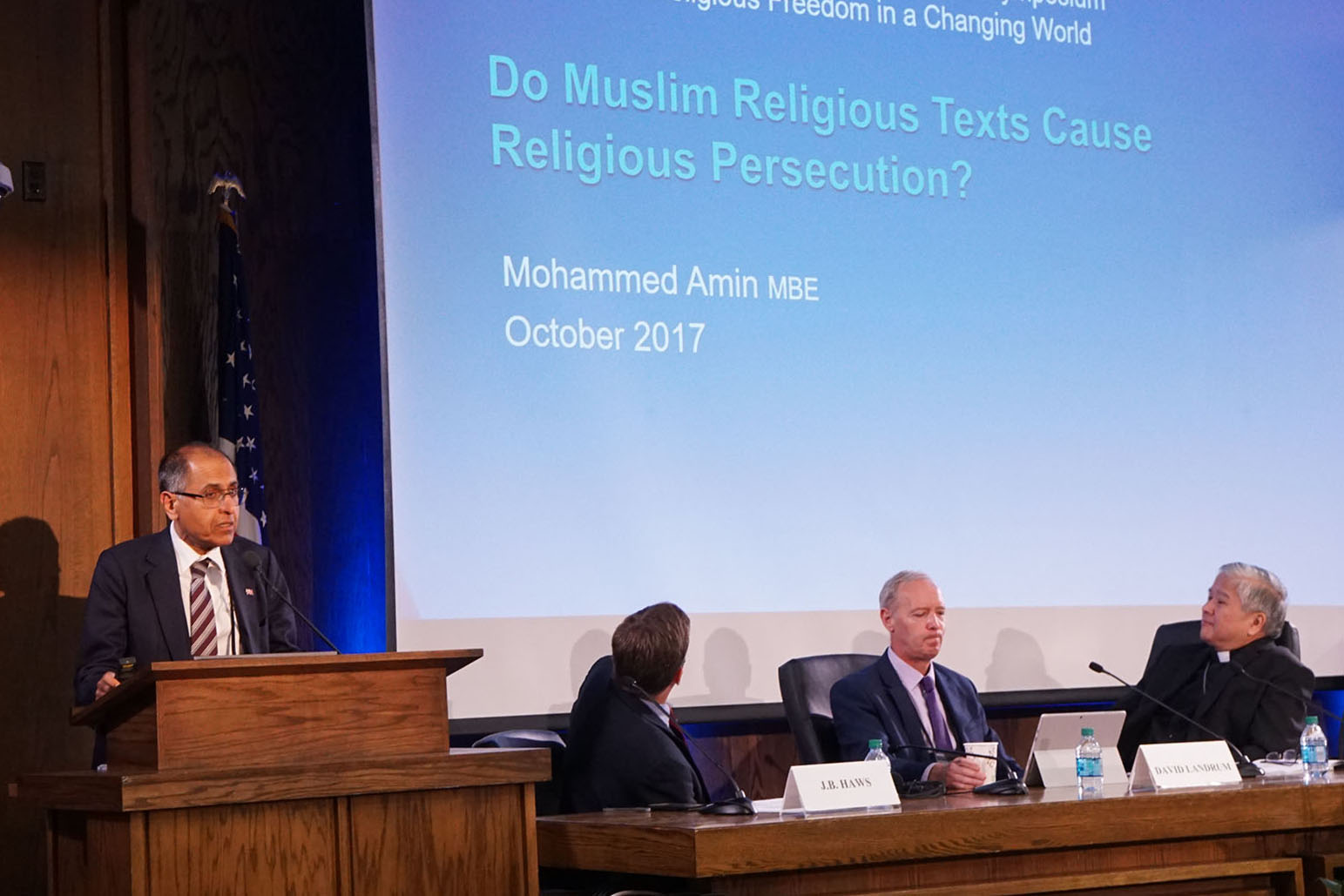
by Kyle Harvey, BYU Law Student and Symposium Volunteer
On Monday, October 2, 2017, the 4:15 breakout session, Faith Perspectives on Religion in a Changing World, was moderated by Assistant Professor of Religious Education at BYU, J.B. Haws. Three key speakers divided the time in the session.
Socrates B. Villegas, Archbishop Lingayen-Dagupan in Pangasinan of the Roman Catholic Church, initiated the session with his remarks. The Archbishop delivered an address sounding a “call for unity” between the faiths and emphasizing five ‘Cs’ necessary to maintaining a faithful perspective in a changing world. Following the Archbishop, Director David Landrum of the Evangelical Alliance UK provided his insights on the context…
Symposium 2017: Religion in a Changing World: Latin American Scholarly Perspectives
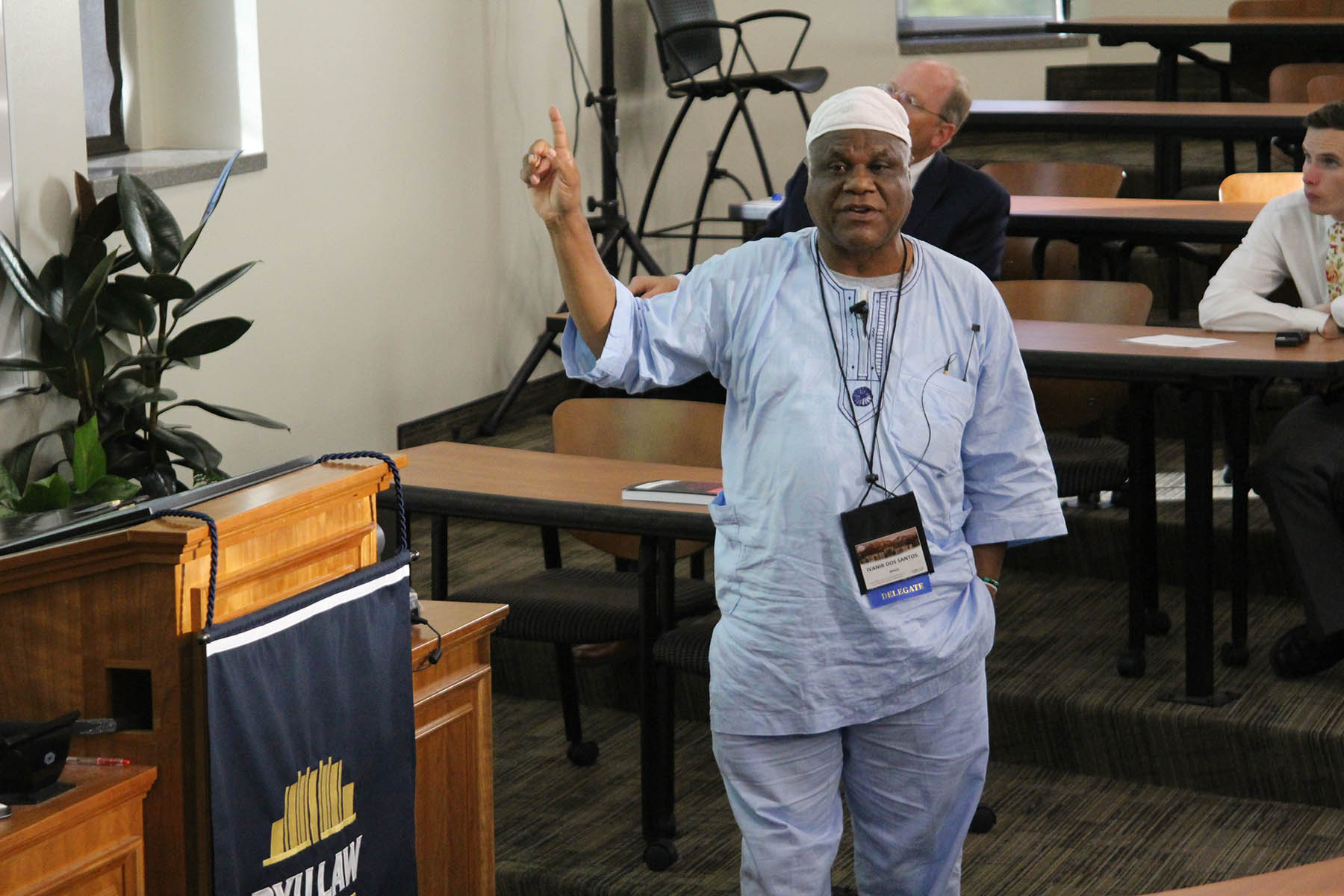
by Alexander Alton, BYU Law Student and Symposium Volunteer
The breakout session on Religion in a Changing World: Latin American Scholarly perspectives was held on Monday, October 2, 2017 and moderated by Scott E. Isaacson, Regional Advisor for Latin America of the International Center for Law and Religion Studies. The session featured three speakers: Juan G. Navarro Floria, a professor of law at Pontificia Universidad Católica in Argentina; Ivanir Dos Santos, a professor at the Center for Articulation of Marginalized Populations in Brazil; and Aldo Alejandro Vasquez Rios, Academic Vice-Rector at Universidad Antonio Ruiz de Montoya….
Symposium 2017: Ukraine
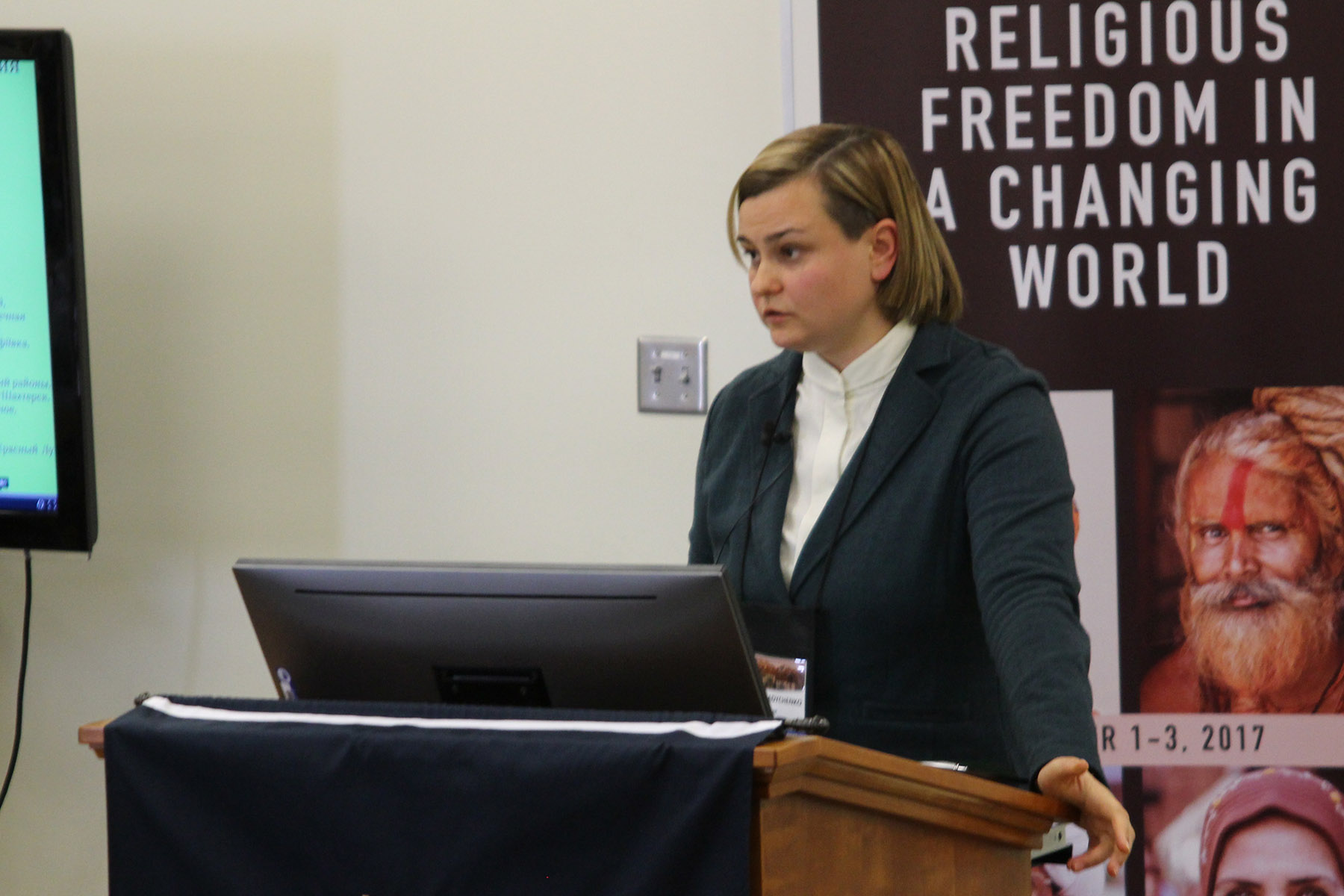
by Malea Moody, 2017 Symposium Executive Committee Member and BYU Law Student
The breakout session about Religious Freedom in Ukraine was held in the afternoon on Monday, October 2, 2017, and was moderated by Celeste Beesley, an assistant professor of political science at BYU. The speakers were Vita Tytarenko, an assistant professor in the Religious Studies Department at the National Academy of Sciences in Ukraine; Larysa Vladychenko, the Deputy Director & an assistant professor of the Religious Affairs Department in the Ministry of Culture in Ukraine; and Dmytro Vovk, an associate professor at Yaroslav the Wise National Law University in Ukraine.
Vita Tytarenko spoke about how Ukrainians are changing how and what they think about religion. She explained that Ukraine is developing as a democratic system still to overcome communism. Most citizens consider themselves citizens of Ukraine, but 8% still consider themselves citizens of the USSR. However, 70% consider themselves religious in some way. The polyconfessionality of their country is continuing to grow, even though 90% of religions consider themselves to be Christian. Tytarenko explained that this is because when part of the secular USSR, there was a large withdrawal from Greek Orthodox churches and Islam. She also explained that during the Euromaidan revolution, people recognized contradictions in the church structure. Citizens wanted to know the difference between formal, state leaders and religious leaders. Even with this, it has been found that most people still trust the church. Tytarenko then explained some of the more recent challenges towards religions freedom. First, the annexation of Krimea has changed Religious Freedom in unexpected ways. There has been an increase in competition between religions, and less people recognize the church as a moral authority. Second, churches trying to claim property has become a large reason for conflict, as well as political disagreements. Third, militants of two extremist groups (Donetsk People’s Republic and Luhansk People’s Republic) continue to threaten and kill pastors, priests, and Christians in the areas that they control. Tytarenko closes saying that these problems can only be fixed by help from the international community.
Larysa Vladychenko focused on activities of state bodies forming policies that affect religions. Religious affairs have gone through multiple departments over the years. It spent time in the Ministry of Justice and then the office of the Prime Minister. Today the functions belong in the Ministry of Religious Affairs of Ukraine. Vladychenko also explained that the government still possess a lot of the property that belongs to churches—about 80% of the religions have not received their property. Churches often have to share property to carry out their services, which has created interconfessional conflict over who actually owns the property. To finish, Vladychenko explained that when citizens are asked about religion, they say that religion should only be allowed to exist if standards of general goodness are promoted.
Dmytro Vovk closed the session with his remarks.
Symposium 2017: Religion and Pluralism in a Changing World: Judicial Perspectives (Monday afternoon session)
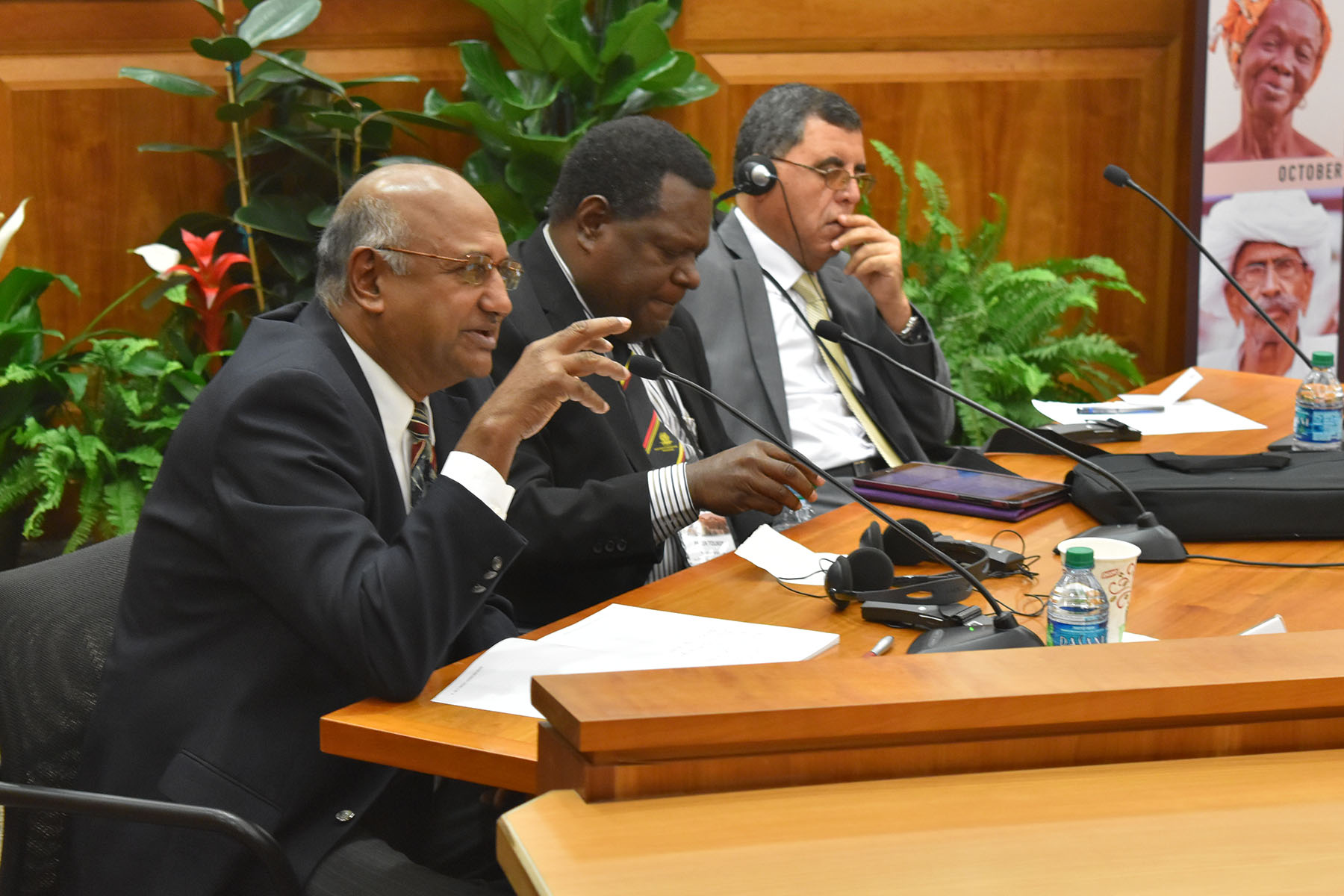
by Melissa Hartman, BYU Law Student and Symposium Volunteer
The breakout session Religion and Pluralism in a Changing World: Judicial Perspectives held on Monday October 2, 2017 was moderated by B. Lynn Winmill, Chief Judge of the US District Court for the District of Idaho. Panelists included Carl Singh, Chancellor of the Judiciary of the Court of Appeals in Guyana, Peter Toliken, Justice of the Supreme and National Court of Justice in Papua New Guinea, Ahmed Ebrahim, retired justice of the Supreme Court of Zimbabwe, and Khalifeh Al Suleiman, Chief of the High Administrative Court of Jordan.
Chancellor Singh remarked on a worrying trend, explaining many countries that have constitutions as the supreme law of the state and which provide for religious freedom are violating these entitlements by state action. He cited, for instance, state action criminalizing clothing associated with particular religious groups, such as the burqa ban in France and Austria’s ban on veils. If anything explains the seeming environment of unity in Guyana, it is because the citizens recognize it is for their own good that they conduct themselves in a manner of tolerance for all religions. He articulated that the challenge in a pluralistic society is that when we try to protect all views, there are often conflicting values and that it is the role of courts to resolve such conflicts.
Justice Toliken explained that religious pluralism in Papua New Guinea has worked well and the government has not done anything to discourage that generally. He described how Christian converts have not forsaken all of their indigenous beliefs, and that Christian beliefs blended well with some of the beliefs the people already had.
Chief Judge Suleiman stated that Jordan maintains a peaceful coexistence among religions and that the government does not discriminate based on religion in implementing the constitution and rule of law in society. Islam teaches that religion cannot be forced and calls for no distinctions between denominations or the sons of Adam.
Justice Ebrahim explained that independence from the executive authority is key in enabling the judicial authority to protect rights and implement the rule of law, a condition necessary for equality. He expressed his belief that diversity and pluralism work well in Zimbabwe and feels that that phenomenon will continue to grow. One reason for this is as people read and understand more about Islam, which religion includes revealed books on Jesus Christ and the sons of David, they’ll see we are all the same people.
Symposium 2017: Philippines, Guam, and Samoa
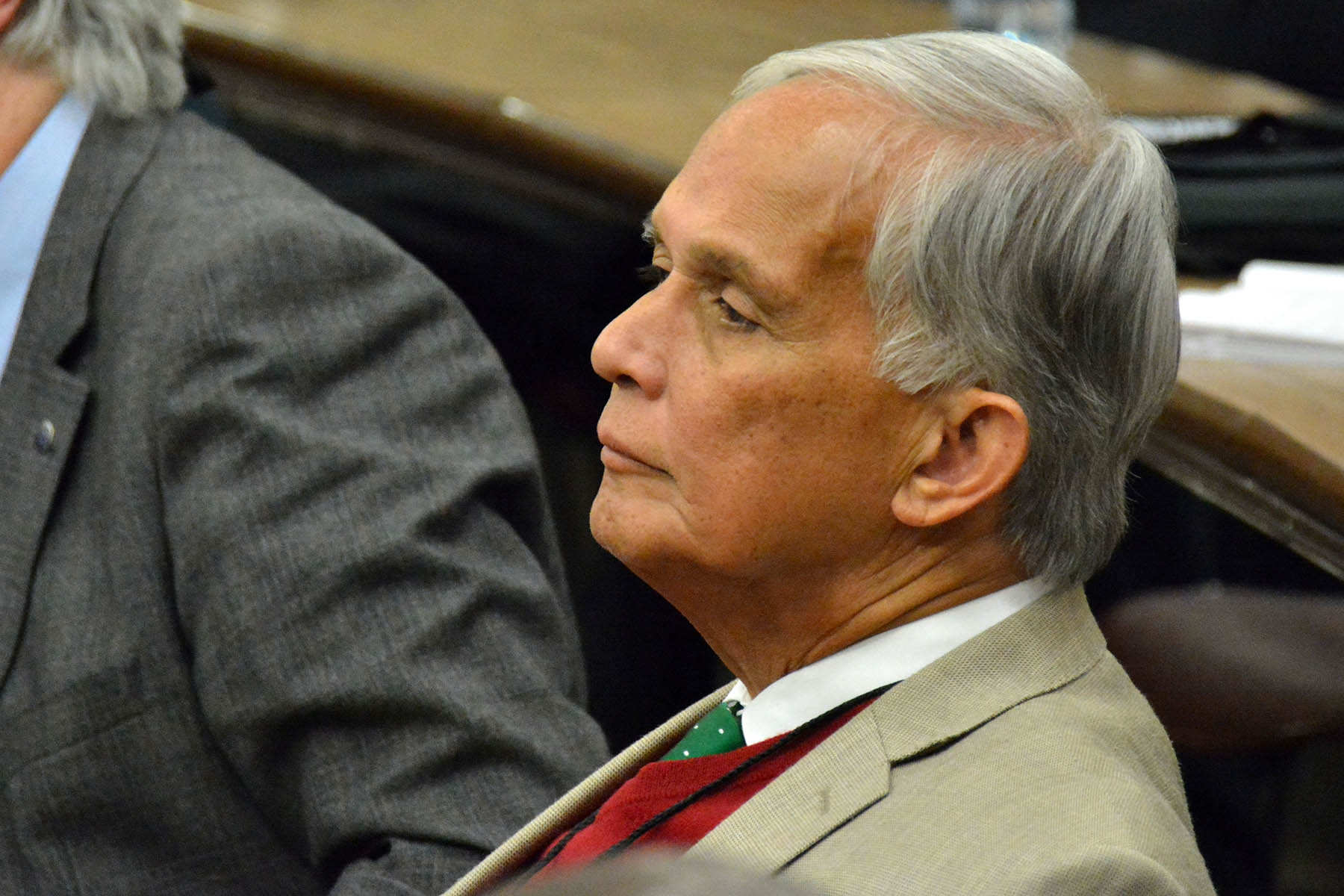
by Jordan Pendergrass, Editorial Associate
Guam, Samoa, and the Philippines were the focus of a breakout session during the 24th Annual International Law and Religion Symposium, held at the Brigham Young University School of Law in Provo, Utah. The session was held in the afternoon on Monday, 2 October 2017, and was translated into multiple Asian languages. It was moderated by Douglas Matsumori, International Fellow for the International Center for Law and Religion Studies. Despite relative geographic similarities, these islands were described in very different terms as to religious freedom and church-state relations.
The session’s first…
Symposium 2017: NIgeria
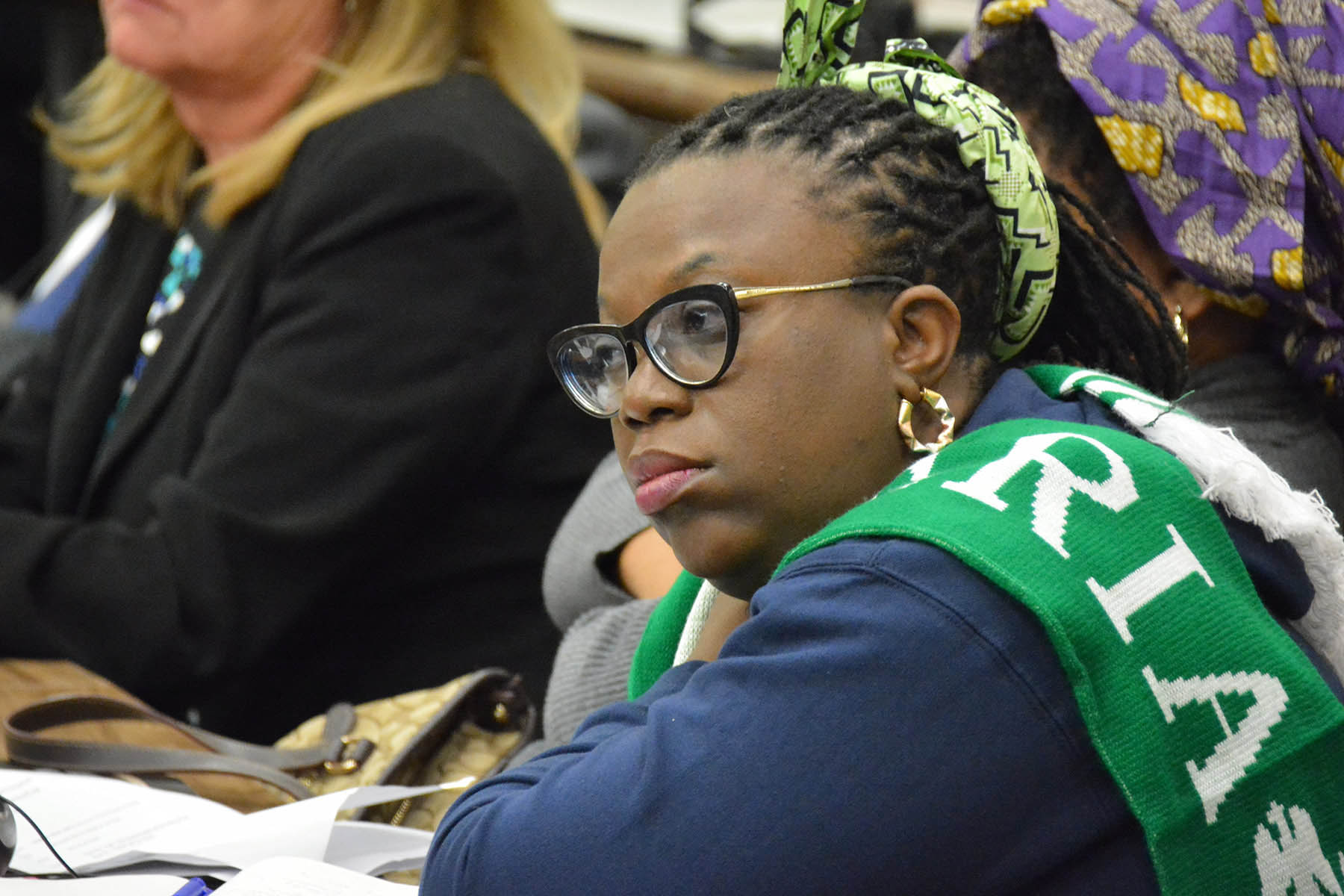
by Shaun Belliston, BYU Law Student and Symposium Volunteer
Nigeria was the focus of a breakout session during the 24th Annual International Law and Religion symposium, held at the Brigham Young University School of Law in Provo, Utah. The session was held Monday afternoon on October 2, 2017, and was translated into several languages. The session was moderated by Bryan C. Jackson, Fellow for the International Center for Law and Religion Studies. During the session, both speakers discussed the multi-religious nature of Nigeria and how it impacts religious freedom in the country.
The first speaker of the session was Professor Chijioke Ohuruogu…
Symposium 2017: Religion and Pluralism in a Changing World: Latin America
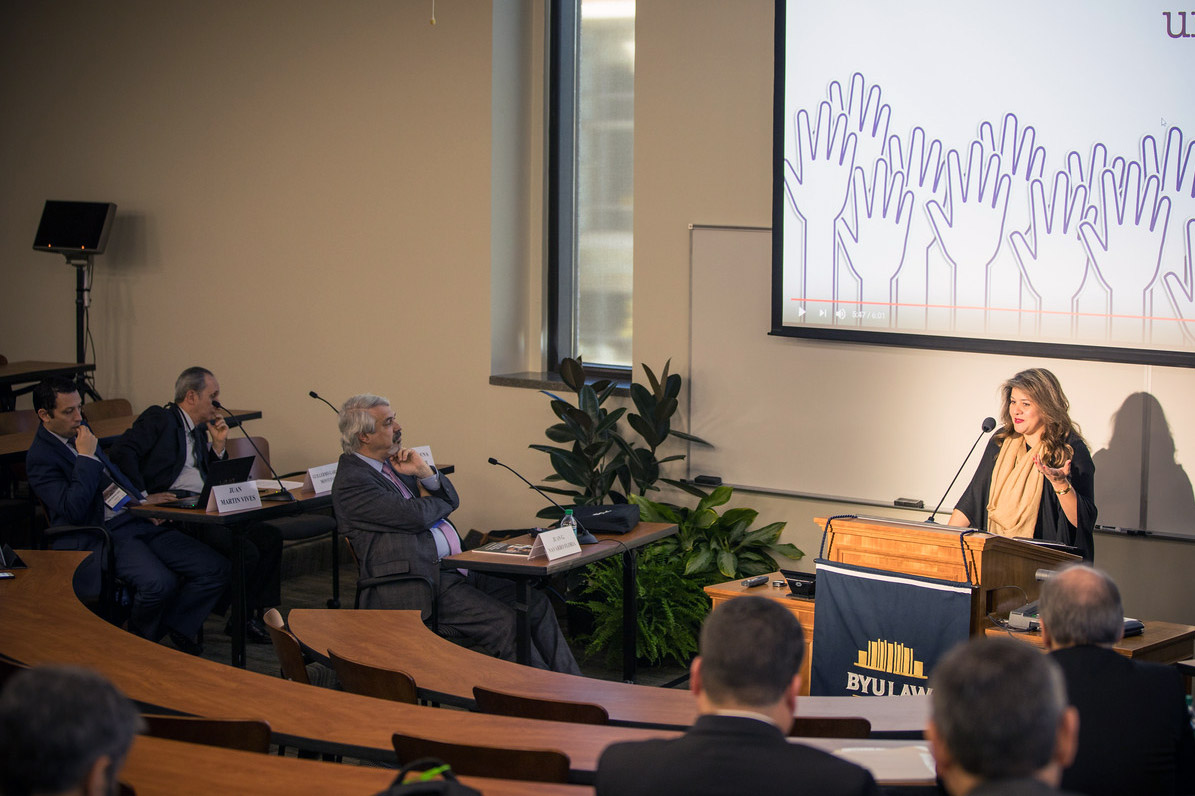
by Malea Moody, 2017 Symposium Executive Committee Member and BYU Law Student
This breakout session was held in the morning on Tuesday, October 3rd, 2017. The session was moderated by Juan G. Navarro Floria, a professor of law at Pontificia Universidad Catolica in Argentina. The speakers were Beatriz Lorena Rios Cuellar, an advisor in religious affairs at the Ministry of the Interior in Columbia; Guillermo Garcia Montufar, a professor at Universidad de Lima in Peru; and Juan Martin Vives, a professor at Universidad Adventista de La Plata in Argentina.
Beatriz Lorena Rios Cuellar presented on how Columbia’s government has worked to protect religious freedom. In 1991 Columbia began to have Freedom of Religion by statute. It consecrates the country to God. The public powers guarantee the country the freedom of religion, specifically stating autonomy from government and immunity from government actions. In 1994 Law 133 was passed clarifying that religious freedom is a fundamental right. Not until 2015 did they pass the law that brought together competent entities to help promote and recognize ways society can help religious freedom progress. There are five ways that they are working to promote it. First is freedom of religion, worship, and conscience, promoted through tax benefits, urban planning rules, and legal personalities; second, citizen participation and social impact; third, peace with a territorial focus; fourth, education and formation of Religious Freedom; fifth, working through international and inter-religion contacts for development. Ms. Rios Cuellar also explained that not just religions benefit from religious freedom. Respecting these freedoms leads to a strengthening of private rights.
Guillermo Garcia spoke about how religious freedom is developing in Peru. He explained that religions have always been required to register to be recognized by the government, but didn’t have much freedom. Then, in 1997 the head of Peru’s Ministry of Justice was invited to the ICLRS religious symposium, held in Provo, Utah. The man was very impressed with what he saw and learned, and returned to Peru to organize a religious symposium in Peru the following year. Peru began inviting people from all over the world to come and help them write a law about religious freedom for their country. In December of 2010 a law was presented and put into effect. However, it failed because the requirements to be recognized as a religion were too strenuous. Last year, they redid the law, making it easier for religions to register. Now the religion must exist in Peru for seven years before they are able to register. They also provided in the legislation that if the religion registered in 2010, they didn’t have to re-register.
Juan Martin Vives presented on the secularization of society, the diversity of religion, and promotion of minority rights, specifically of homosexuals and indigenous people in Argentina. He said that many of the issues seen as problems of religious freedom are not actually problems for religion. He also said that as believers in a faith, we must recognize that we cannot force our beliefs on society. Religious freedom should not be considered a sword but rather a shield to protect believers and maintain a space for them. The examples that were given were homosexual marriage, gender identity, and the decriminalization of abortion. He asked the audience to consider if these are truly religious freedom problems at the core. After, he explained that for religious believers to secure freedom, they need to start focusing on their own problems now, to focus rather on strengthening their rights rather than preventing the rights of others.
Symposium 2017: Russia
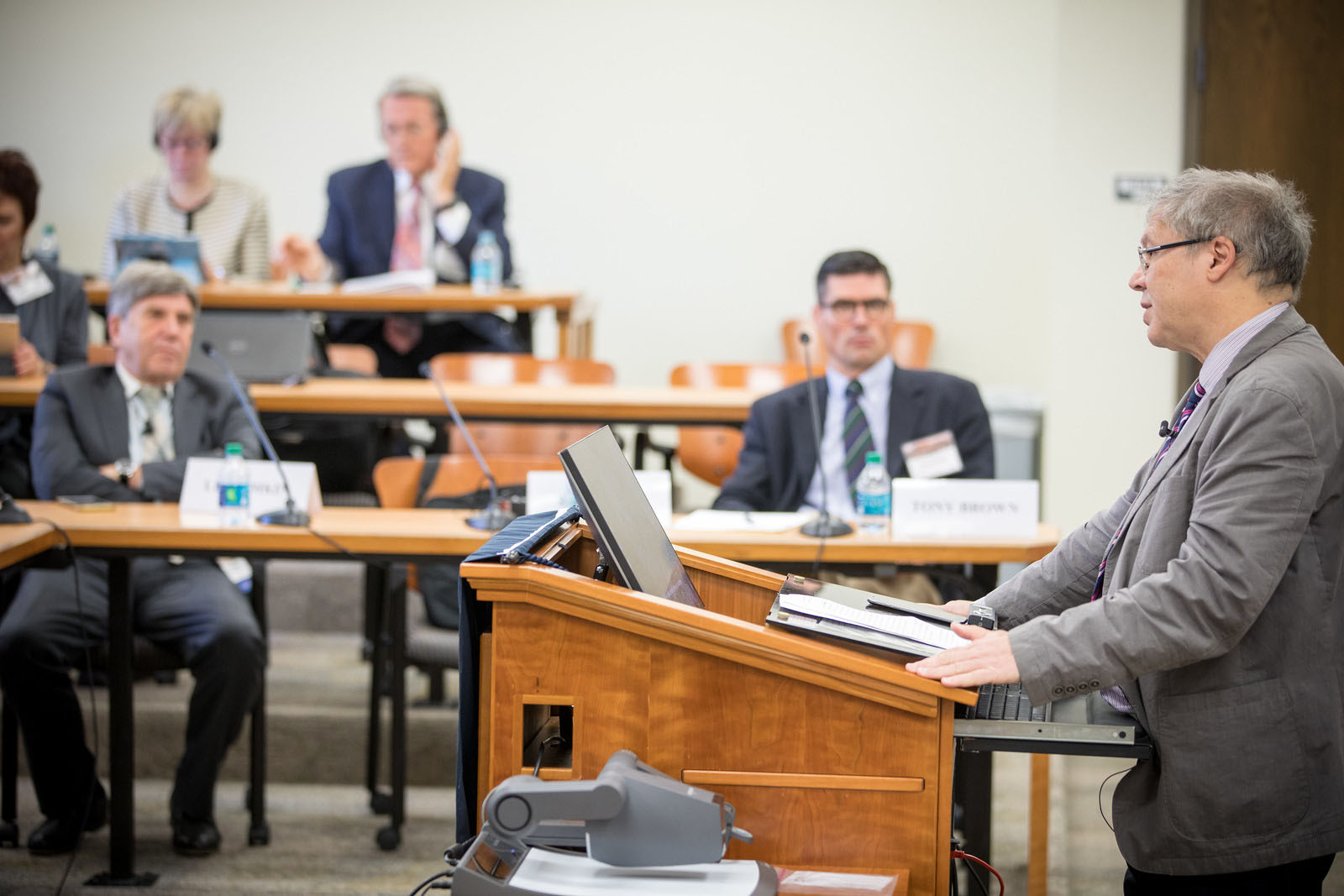
by Melissa Hartman, BYU Law Student and Symposium Volunteer
The breakout session on Russia was held Tuesday, October 3, 2017 and moderated by Tony Brown, professor of German and Russian at Brigham Young University. It included panelists Nikolai Shaburov, professor at the Russian State University for the Humanities, and Lev Simkin, professor of law at the Russian State Academy of Intellectual Property.
Professor Shaburov described Russia’s current religious climate where religions are viewed as though in a hierarchy, with the Orthodox religion occupying the highest position and religions viewed as “non-traditional” occupying…
Symposium 2017: Third Plenary: Religion and Rule of Law in a Changing World
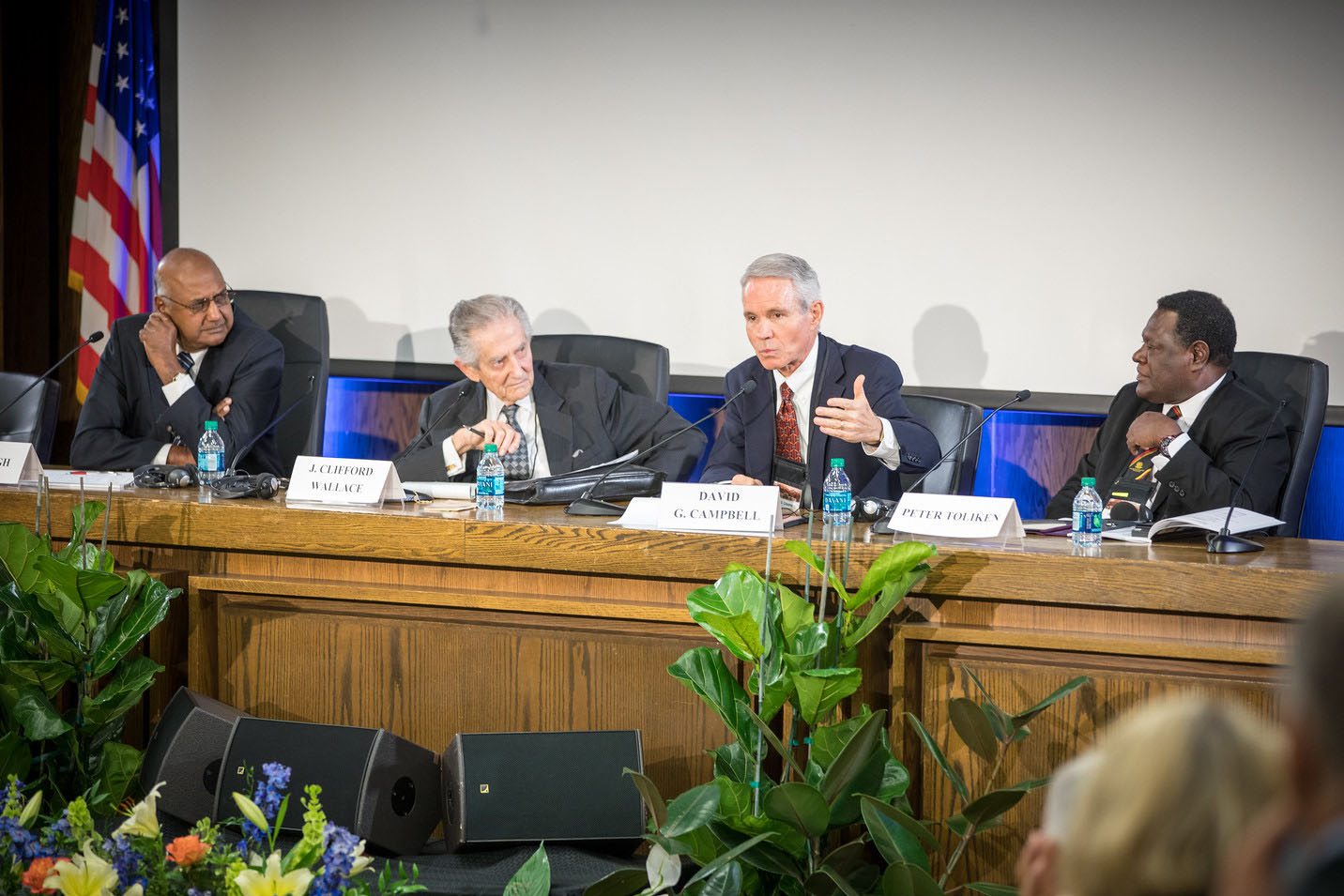
by Alexander Alton, BYU Law Student and Symposium Volunteer
The third plenary session, entitled Religion and the Rule of Law in a Changing World, was held on Tuesday, October 3, 2017 and moderated by Judge Clifford Wallace, Emeritus Chief Judge of the U.S. Court of Appeals for the Ninth Circuit. The three panelists were Chancellor Carl Singh of the Court of Appeals in Guyana, Justice Peter Toliken of the Supreme and National Court of Justice in Papua New Guinea, and Judge David Campbell of the United States District Court for the District of Arizona.
One major topic of discussion amongst the judges was whether courts should act to level the playing field when there is a dominant church. Chancellor Singh commented that when the constitution provides for a secular state, like the constitution of Guyana, then the courts can intervene to prohibit the government’s support of a dominant church. However, he believes that if the constitution provides for a dominant religion, then it is…
Symposium 2017: Religion and the Rule of Law: Judicial Discussion
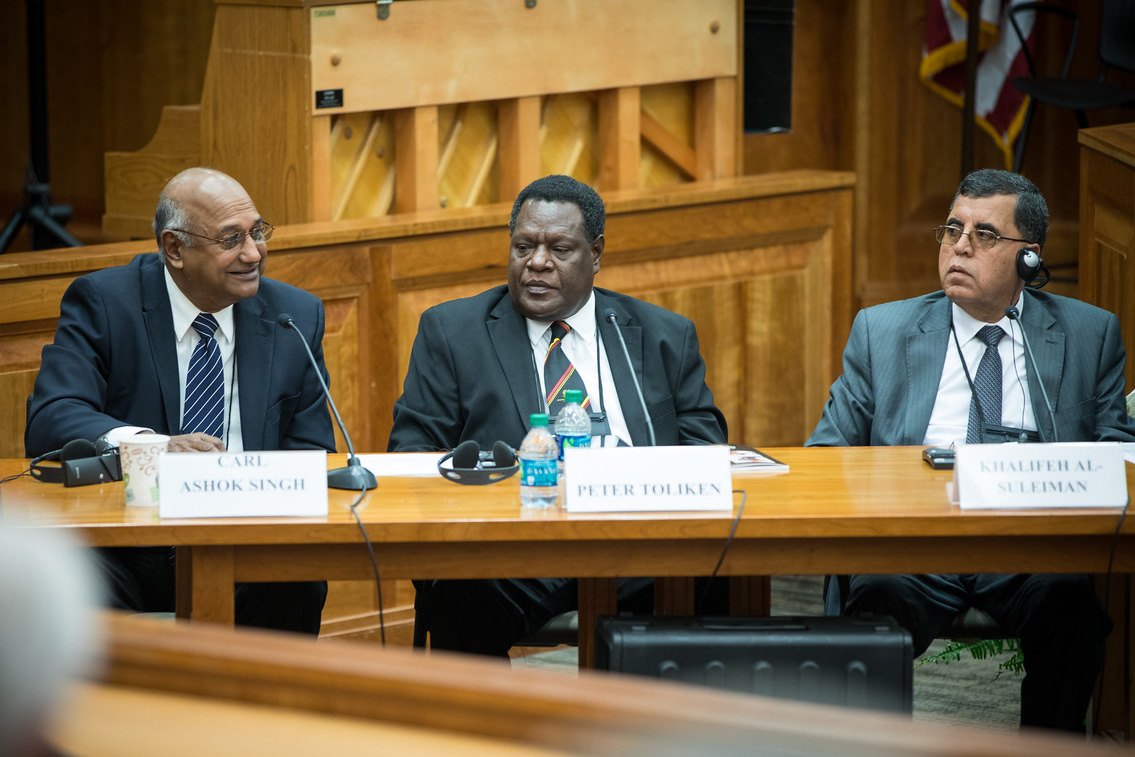
by Alexander Alton, BYU Law Student and Symposium Volunteer
Judge David Campbell of the United States District Court for the District of Arizona moderated a Judicial Discussion on Religion and the Rule of Law held on Tuesday, October 3, 2017. The panel featured Justice Khalifeh Al-Suleiman, Chief of the High Administrative Court of Jordan; Justice Ahmed Ebrahim, retired justice of the Supreme Court of Zimbabwe; Chancellor Carl Singh, Chancellor of the Judiciary for the Court of Appeals of Guyana; and Justice Peter Toliken of the Supreme and National Court of Justice in Papua New Guinea. All five of the countries represented by the judges were formal British colonies and have a heritage of British…
Symposium 2017: Vietnam
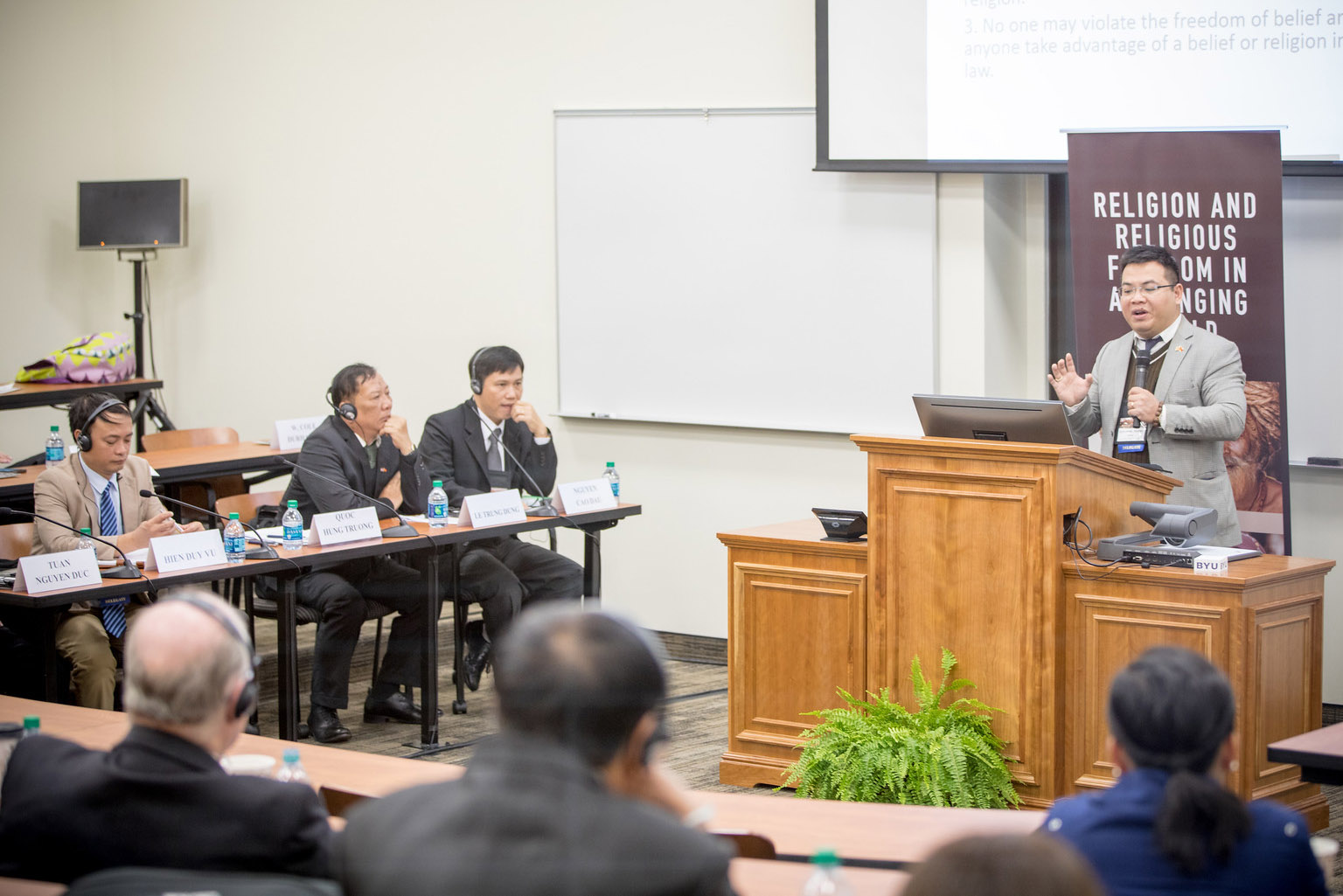
by Thomas Palmer, BYU Law Student and Symposium Volunteer
Moderated by W. Cole Durham, Jr., Founding Director of the International Center for Law and Religion Studies, the Vietnam breakout session took place at 10:00 am on Tuesday, October 3, 2017. Panelists were Nguyen Cao Dau, Vice Director, Department of Humanitarian Affairs, Ministry of Public Security; Le Trung Dung, Deputy Department Head, Department of Public Security; Quoc Hung Truong, Director, Department for General and International Affairs, The Institute for Legislative Studies, The National Assembly of Vietnam; Tuan Duc Nguyen, Vice Chairman, Committee for Religious Affairs, Hanoi City; and Hien Duy Vu, Head of the Specialist Bureau…
Symposium 2017: Ethiopia
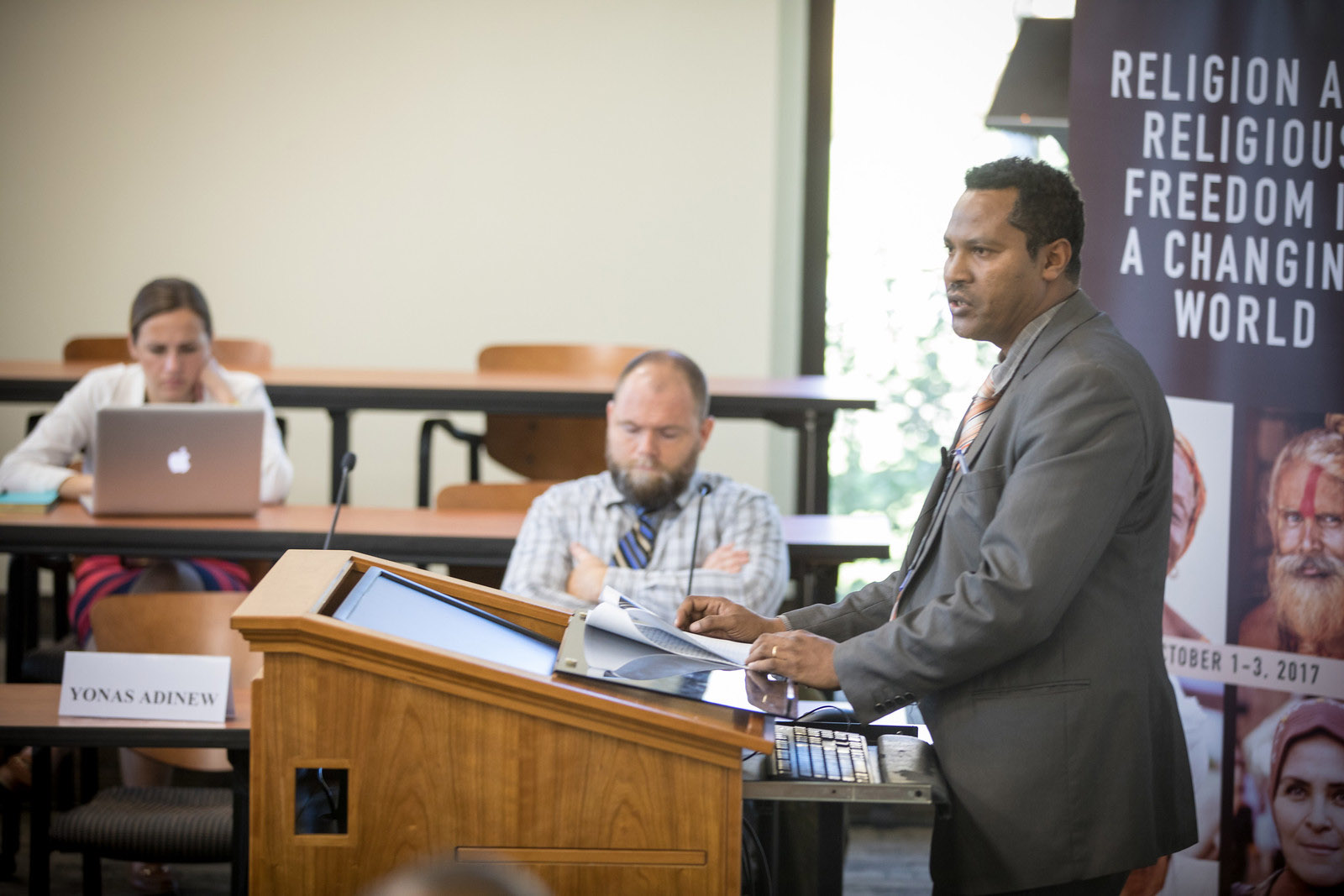
by Sara Plater, 2017 Symposium Executive Commitee Member and BYU Law Student
Peter Leman, Associate Professor of English at Brigham Young University, moderated the breakout session on Ethiopia hed on Tuesday morning, October 3, 2017. The speaker was Yonas B. Adinew, Head, Addis Ababa University School of Law.
Mr. Adinew shared a historical background of Ethiopia with the audience including information on the demographics of the country before speaking of the religious history.
Of the more than 80 ethnic groups in Ethiopia, the vast majority of the population subscribe to the Ethiopian Orthodox Church. Christianity came to Ethiopia during the 4th century. Consequently, this makes the country one of the first Christian nations in the world and Christianity has been embedded in the way of life of the nation including in its political, social, and economic spheres.
Muslims constitute the second largest religious group. Islam was introduced to Ethiopia during the 7th century when a group of followers of the Prophet Mohammed who were being persecuted in Arabia sought sanctuary in Ethiopia. Upon their arrival in Ethiopia, they were brought before the king who gave orders for the followers to be protected and cared for regardless of the fact that they were of a different religious orientation. Ever since, the two dominant religious traditions in Ethiopia have lived in peaceful co-existence.
Both the 1931 and the Revised 1955 Constitutions of Ethiopia declared Ethiopian Orthodox Christianity as the state religion. This made the Ethiopian Orthodox Church a very powerful institution. The declaration of the two constitutions has been a source of grievance of the Muslim community in the country which has long complained about alienation and discrimination.
In 1974, Emperor Haile Selassie was dethroned from power by a military coup led by a military junta called the Derg. The Derg declared Ethiopia a Socialist Republic and dispersed with the 1955 Revised Constitution. The Derg confiscated properties belonging to the Ethiopian Orthodox Church and in 1987, established a constitution which repealed the Ethiopian Orthodox Church as a state religion.
The Ethiopian People’s Revolutionary Democratic Front (EPRDF) took power in 1991 after defeating the Derg. The 1995 Constitution which was adopted by the EPRDF led coalition government declared state and religion separate and said there shall be no state religion. The 1995 constitution also laid the foundation for religious pluralism. It made it possible for religious institutions to assume judicial power. This made it possible for the establishment of Shari’a courts both at federal and regional levels. Since the EPRDF government, many religions enjoyed a greater amount of freedom.
Nevertheless, Ethiopia started losing its reputation for peaceful co-existence of religions in recent times as a result of various conflicts which plagued religious communities in the country. The government has been complaining of growing trends of religious expansionism and violent conflicts. Unfortunately, there has been instances of burning of churches and killing, including the killing of imams.
Following the adoption of Civil Society (CSO) law in Ethiopia which banned civil society groups in the country from engaging in human rights advocacy, authorities now worry that religious institutions are being used to sow seeds of discord and disharmony among the public and hence, have interfered in the internal affairs of religious traditions. This is particularly manifested in heavy-handed responses to protests and in failing their own people at the helm of these religious institutions.
Moving forward, Mr. Adinew recommends fostering religious harmony and peaceful co-existence among the public, reversing and countering efforts of some groups to politicize religions, reserving limitations and restrictions on religious experiences, no longer using the courts to muzzle in issues of religious freedom.
Symposium 2017: Love, Religion, and Law
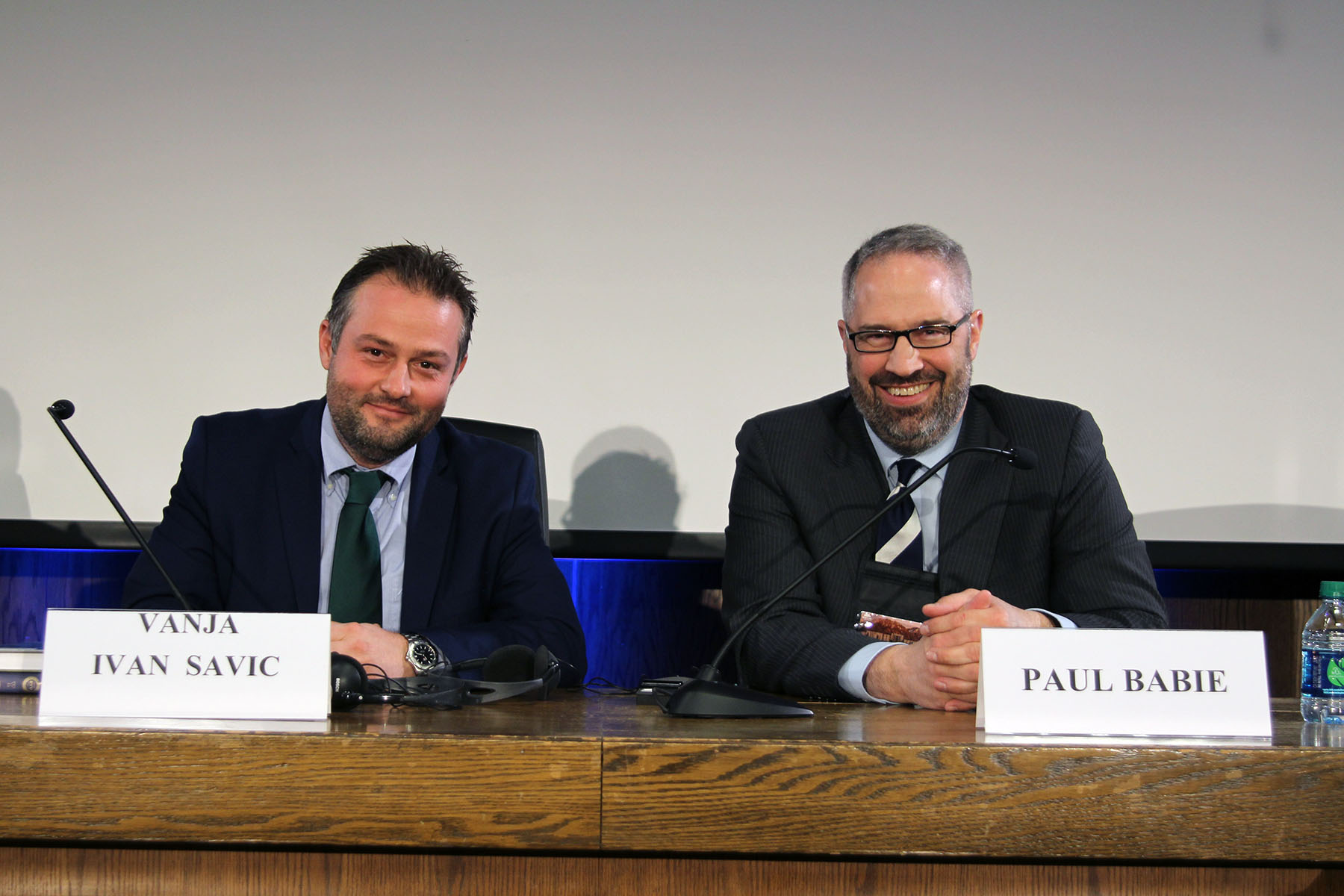
The breakout session, Love, Religion, and Law, held on Tuesday, October 3, 2017, introduced the just-published book, Love, Religion, and Law, edited by Paul Babie, Professor of Law, Adelaide Law School, University of Adelaide, Australia, and Vanja-Ivan Savic, Assistant Professor, Head of Department for Legal Theory, University of Zagreb, Croatia. Brett Scharffs, Director, International Center for Law and Religion Studies, BYU Law School, wrote the introductory chapter.
Professor Savic gave the background of the book. It grew out of a project he was working on with Professor Babie. They were answering the questions of how to solve community problems, which led them to an examination of…
Symposium 2017: Religious and Cultural Pluralism in a Changing World
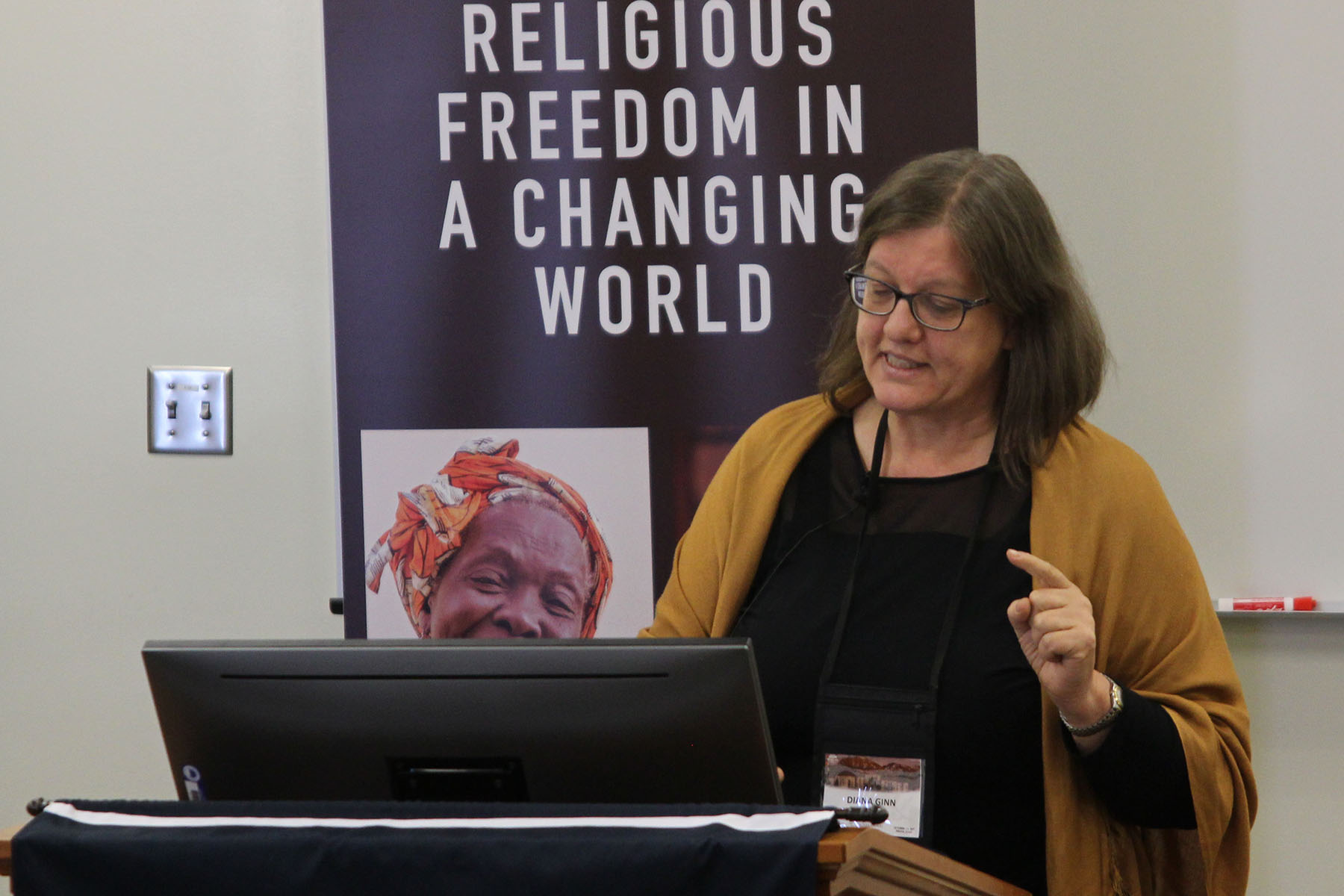
by Thomas Palmer, BYU Law Student and Symposium Volunteer
The breakout session, Religious and Cultural Pluralism in a Changing World, was held at 11:15 am on Tuesday Morning. Moderated by James A. Heilpern, Law and Corpus Linguistic Fellow at the J. Reuben Clark Law School, Brigham Young University, the session featured Diana Ginn, Professor, Schulich School of Law, Dalhousie University, Canada, and Tore Lindholm, Professor, Norwegian Centre for Human Rights, University of Oslo, Norway.
Professor Ginn explained that Canada is one of the most multicultural countries in the world. Multi-culturalism has become part of Canada’s identity. Canada has become increasingly religiously diverse as well. Christianity has been declining, and other religions, including those with no religion (the Nones), have increased.
Professor Ginn explained that there was a strong common law tradition for religious freedom in Canada even before the charter was incorporated into the Constitution in 1982. The Charter now protects religious freedom at the constitutional level and owes a duty of neutrality among faiths and between believers and non-believers.
Professor Ginn discussed several interesting cases concerning religious freedom, including the controversy surrounding Trinity Western University. Even though she supports sexual minorities and equality rights, she says that Trinity Western has the stronger legal arguments because barring the students does nothing to remedy past wrongs to the LGBT community.
Trinity Western is so controversial because it is viewed as a clash between freedom of religion and equality rights.
Professor Ginn continued by discussing her suspicion that many Canadians would like to have a hierarchy of rights. With most (but not all) on the left arguing that equality should outweigh freedom of religion and most (but not all) on the right arguing that religious freedom should outweigh equality.
Professor Lindholm asked: Is it feasible that religious communities (and non-religious people that have no community to belong to), each one on their own could find doctrinal grounds to support freedom of religion or belief? Can persons of community of faith or conviction whose convictions are grounded in specific and distinct doctrinal beliefs be grounded in a similar conception of religious belief?
Such agreement is desirable and is already in process in our constantly changing world. Such a right must be acknowledged as a universal human right. FORB must be understood broadly according to 1993 general comment to ICCPR by HRC said that FORB in Article 18 “protects theistic and nontheistic and atheistic belief as well as right not to practice any religion or belief.” Professor Lindholm continued by giving examples of how this ideal can be realized.
Symposium 2017: Mongolia and Republic of Korea
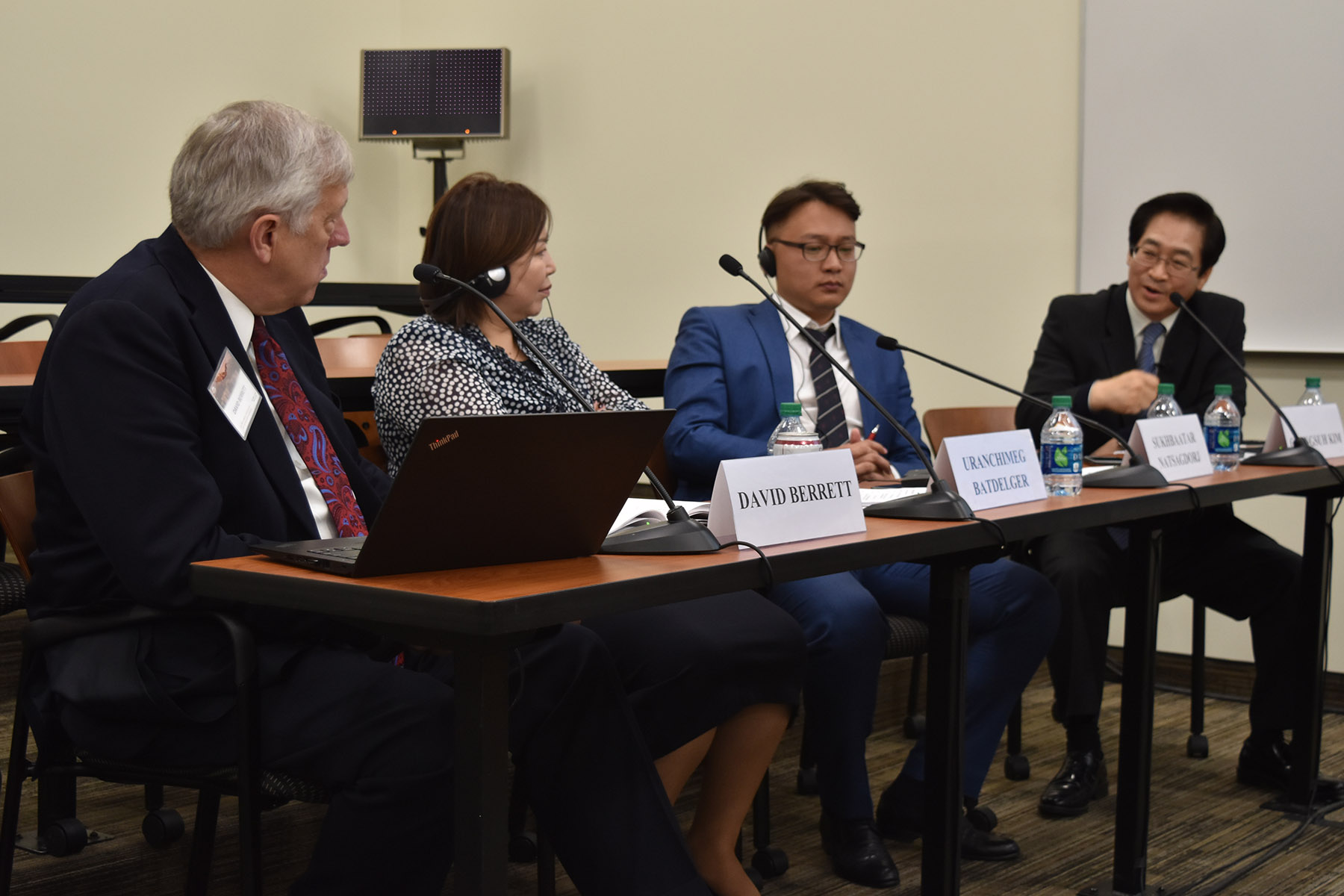
by Shaun Belliston, BYU Law Student and Symposium Volunteer
The Republic of Korea and Mongolia were the focus of a breakout session held on Tuesday October 3, 2017. The session was moderated by David Berrett, Area Legal Counsel for The Church of Jesus Christ of Latter-day Saints. Mr. Berrett welcomed the audience and introduced the delegates from the Republic of Korea and Mongolia. The delegates consisted of Chongsuh Kim of the Republic of Korea, and Uranchimeg Batdelger and Sukhbaatar Natsagdorj of Mongolia. The session was translated into many languages.
The first speaker of the session was Chongsuh Kim, professor of Religious Studies at Seoul National University. Professor Kim has…
Symposium 2017: Jordan
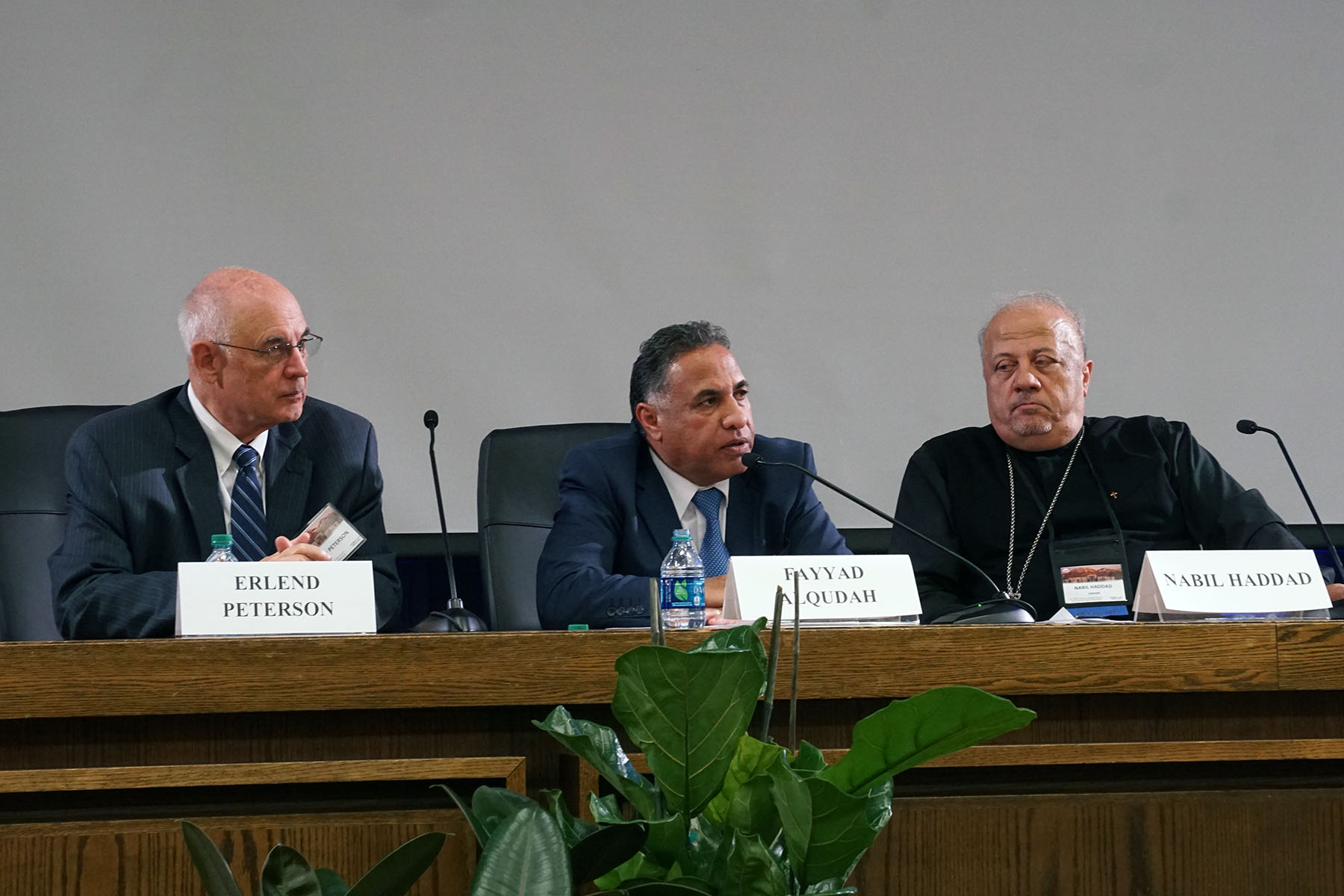
by Thomas Palmer, BYU Law Student and Symposium Volunteer
Erlend Peterson, Senior Fellow for the Middle East for the International Center for Law and Religion Studies, moderated the Tuesday Afternoon breakout session on Jordan. Panelists were Fayyad Alqudah, Dean, Faculty of Law, University of Jordan Law School, and Nabil Haddad, Founder and Director, Jordanian Interfaith Coexistence Research Center, and Dean, Saints Peter and Paul Old Cathedral.
Professor Alqudah began by discussing the constitutional guarantee of religious freedom in Jordan. On Nov. 9, 2004 the King of Jordan called for tolerance and unity in the Muslim world. Professor Alqudah discussed the different sects in Jordan and laws that are meant to protect them. He continued by saying that although the Jordanian King’s message from 2004 has not eliminated violence in the name of religion in surrounding countries, religious freedom has been respected in Jordan.
Father Haddad began by explaining that religious freedom is a right granted unto us from our creator because we are created in the likeness of our God. Man is free in his choice, but also responsible for what he chooses. When discussing religion and religious freedom in a changing world we must realize that technology expands the reach of religious ideologies and shrinks our world at the same time. In the past few years, extremism has accelerated in our societies. Father Haddad discussed some of the elements that lead to extremism and how we can prevent it from spreading.
Father Haddad said that Christians in Jordan are not a minority although they are 4% or less of the population because they refuse and will continue to refuse to be considered a minority. They are part of a community that are small in number, but not a minority. Father Haddad continued by sharing his experience in promoting the Jordanian King’s message to other Muslim-majority countries and discussed the importance of living in harmony with his Muslim neighbors. The most dangerous thing we could do is to create a conflict between Muslims and Christians. It is instead a confrontation between the moderates who believe in peace, human rights, and dignity and those who do not, regardless of their religion.
Symposium 2017: Brazil
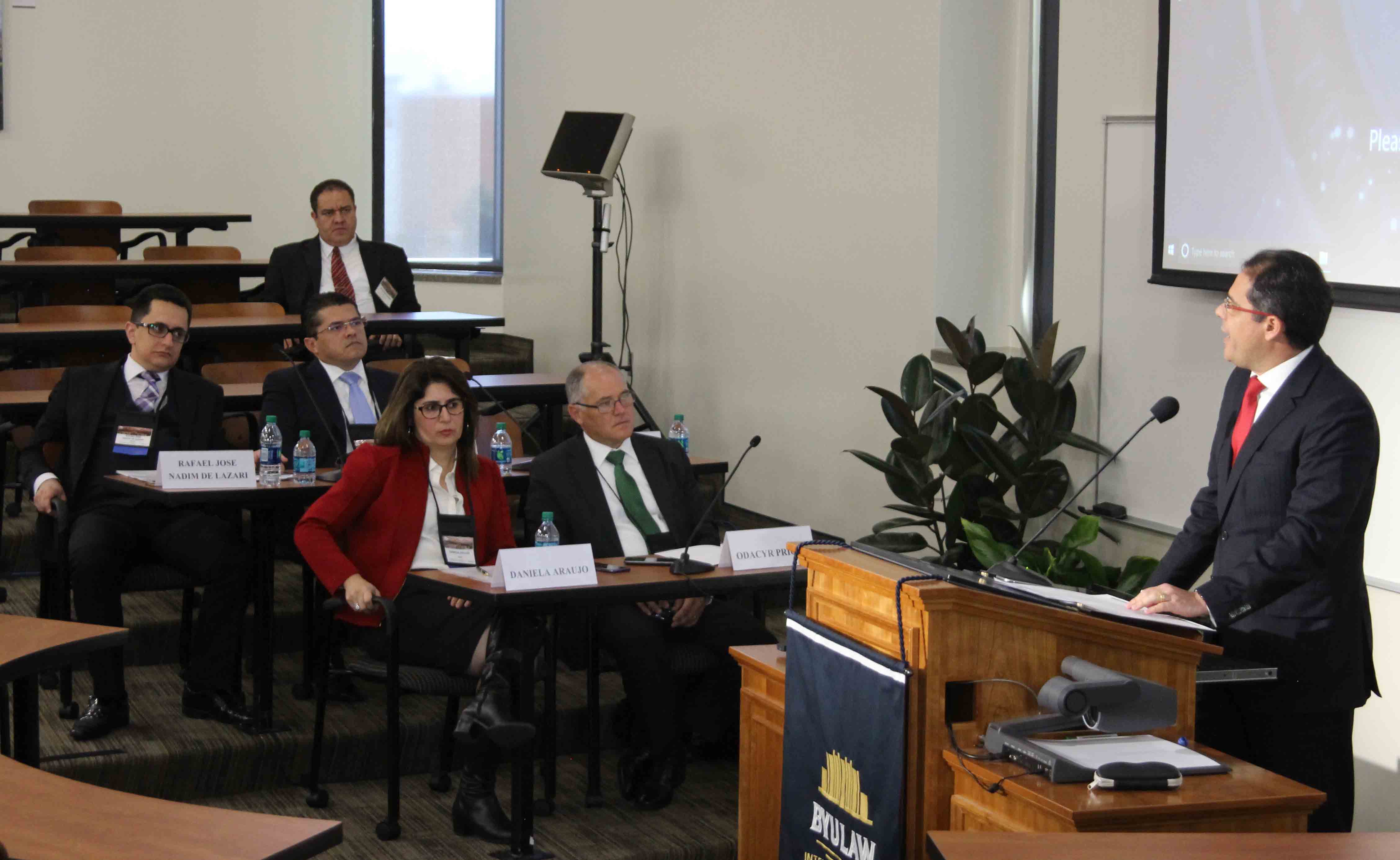
by Gaylee Coverston, Symposium Volunteer
Odacyr Prigol, chair of the Curitiba chapter of the J. Reuben Clark Law Society and Managing Partner of Prigol Advogados Associados, moderated the session on Brazil. He welcomed the audience, thanked the university and introduced the delegates from Brazil.
Daniela Araujo Espurio, a senior lawyer in the Real Estate and Litigation Department at Cerqueira Leite Advogados, has two post graduate degrees, one in Real Estate Business from Fundacao Getulio Vargas and another in Public Law from the Catholic University of Minas Gerais. She has become very devoted to the cause of Religious Freedom. Daniela opened her speech discussing the issue of religious intolerance in Brazil. Pope Francis has said, “The Future is in the respectful coexistence of diversity, not in the homologation of one single theoretically neutral thought. It becomes, therefore, indispensable to recognize the fundamental right to religious freedom in all its dimensions.” One of the most important opportunities of this conference is to break the silence and open a dialogue regarding current experiences from representatives of various countries, particularly religious leaders, educators, and legislators with the purpose of finding a way to inhibit violence. Brazil, as a secular state, constitutionally declares non-interference regarding creation and function of religious entities. In her interactions and friendships with people of all faiths, Daniela has learned that a person should not be judged by their beliefs nor a religion judged by a single person or a group of persons intent on violence using distorted concepts of religion as reasons to perpetrate violent acts. Religious violence in Brazil is on the rise, particularly violence against Afro-Brazilian and Muslim religions, and the violence aims to silence its victims. As an example of one of these acts, an Umbanda and Candomble place of worship was desecrated, the leaders assaulted, and the participants threatened. Interfaith groups and state and national leaders have increased their united fight for religious freedom. Religious freedom exists because of enacted laws in Brazil and every citizen needs to be aware of the risks to said freedom that such violence embodies. Countries are also uniting under international treaties to protect this innate right. She cited current international laws and treaties establishing religious freedom. She stated that citizens must report incidents and require police and other government entities to uphold these laws. However, it is up to each individual to exemplify respect for all belief systems and to help those who do not to recognize the need for respectful coexistence. Daniela also discussed Brazilian law establishing public education as non-confessional or without a specifically established religious education. However, on the 27th of September, by majority vote of the Ministers of the Supreme Federal Court, public religious education was declared confessional and public-school teachers allowed to preach their own religious precepts and influence students in school. Intolerance exists due to lack of understanding. Religious education in schools should be historically or theoretically presented with the intent to demystify misconceptions that lead to hate or contempt of any religion and promote respect for all beliefs. This new decision is cause for great concern and could cause greater problems for religious freedom in Brazil rather than improving the situation. Daniela concluded that religious freedom is one of the most valuable instruments for maintaining equality and human dignity. As this inalienable right is carefully defended and valued, the opportunity for peaceful coexistence increases dramatically.
Aroldo Cavalcante, former city attorney of Recife, managing partner of Barreto Cavalcante Advogados and the J. Rueben Clark’s Area Director for South America, is a member of the Law and Religious Freedom Committee of the Brazilian Bar Association. He began his presentation with these quotes from the American case of Thomas versus Review Board, “The determination of what is belief or religious practice is, in many instances, a difficult and delicate task. However, the resolution of this issue should not take into account the judicial perception of beliefs or practices. Religious beliefs need not be acceptable, logical, coherent or understandable to others, in order to merit the protection of the first amendment.” Brazil, since 1890, established the concept of religious freedom in its constitution and currently defines religious freedom and governmental application in article 19 of the 1988 constitution, which Cavalcante quoted. Although the greater percentage of the country is Catholic, Brazil is officially a secular state. However, Cavalcante agreed with Babalawo Ivanir dos Santos that being a formally declared secular state is not enough. Brazil, unlike Mexico, Argentina, or Spain, has no legislation regarding the exercise of religious freedom. This being said, judicial decisions can sometimes result in disseminating, to a greater extent, disrespect and intolerance for other religions. Cavalcante focused on two aspects, the actual freedom to believe and the guarantee to not be deprived of one’s rights due to religious beliefs. Belief as an inner consciousness is always free. Legal regulations cannot impede human beings from thinking or believing in a particular way or in a particular divinity. Freedom of belief not only protects an individual’s right to believe as they choose, but also to live their lives accordingly, practicing their beliefs in active, external demonstrations. At times, a person’s external profession of their beliefs can be contrary to practices within the State. Currently there are multiple cases regarding holy day observance in Brazil and the judicial treatment of this issue lacks uniformity. Some religions regard Saturday as their Holy Day. In Brazil, state educational exams are held on Saturdays. In an attempt to be able to observe their Holy Day, while not being disadvantaged educationally or professionally, cases have come before the court to petition an alternative day for state exams. The judicial decisions have varied greatly. Cavalcante quoted article 18 of the Universal Declaration of Human Rights and the UN’s Resolution 36/55 that clarifies the rights of conscience/religion and its application in daily life, one of those being the observance of a Holy Day or day of rest. “The right to freedom of thought, conscience, religion or convictions shall in particular include the following freedoms: h) To observe days of rest and to celebrate festivities and ceremonies according to the precepts of a religion or belief.” One judgement sided with the plaintiff, stating, “The purpose of the foregoing standard is to establish the guarantee that no one will be obliged to act contrary to their own beliefs or religious principles. The Brazilian State as a secular entity corroborates that thought, assuring religious freedom jointly with exercising citizenship.” Yet another judgement saw the exception as giving special preference to one religious entity. “There is no law or any other legal rule, even if general and abstract, that authorizes or determines the application of tests in an alternative time to benefit adherents of religion, groups or associations of any kind.” This discrepancy regarding the issue establishes the need for judicial action until a better solution is achieved. Brazil is working toward true religious freedom. Each step is an attempt to protect the freedoms of its citizens. He finished by quoting Leo Tolstoy, “If I know the way home and am walking it as though drunk, it doesn’t cease to be the right way because I am staggering from side to side. If it is wrong, then show me another way…. Do not rejoice in my error, instead give me your help and support.” Brazilians and their government are moving in the right direction, even if they are staggering along the way.
Valdetario Monteiro, a lawyer who specializes in business law and taught public law at Christus School of Law in Fortaleza, has held many positions. He is a member of the Ceara Academy of Legal Letters and the Institute of layers of Ceara as well as the Brazilian Bar Association. He was General Secretary, President of the Ceara chapter and also Federal Council for the Brazilian Bar Association. He currently serves as Advisor to the National Council of Justice. Valdetorio first opined on properly defining the terminology “Freedom of Religion” which has come to refer to the idea of tolerance for different systems of belief and “Freedom of Worship” which has come to mean individual liberty of conscience or devotion. Throughout history this concept of freedom has been limited or misunderstood, impacting even the freedom to come and go. Due to its importance, Religious Freedom should be understood as freedom of conscience, belief and opinion upon which a free society should be founded. The question of religious freedom is complex, necessitating an interdisciplinary approach involving not only juridical science but also history, theology, anthropology, religion and philosophy. The constitutional history of Brazil and religious freedom in Brazil are interconnected as each new constitution addresses this issue in a slightly different way, expanding and redefining what religious freedom entails. Valdetorio touched on all Brazilian constitutions ending with the current constitution of 1988, which includes many rights established by the international Human Rights Treaty, ratified by Brazil. One of the fundamental rights of the 1988 constitution is freedom of religion and the reaffirmation of Brazil as a secular state that will not adopt, encourage or promote any God or religion. He continued by citing Article 5, subsection VI and VII, Article 19 subsection I, Article 150 subsection VI b, Articles 210, 213, and Paragraph 2 of 226, all specifying aspects of religious freedom. Religious freedom in Brazil since 1988 basically means the right to any belief system including atheism or agnosticism and the right to portray those beliefs in everyday life. The current legal debate comes from applying the various religious freedom principles laid out in the 1988 constitution. The everyday life issue of religious education in the public schools currently demands special attention and is a hotly contested subject. Brazil, as a secular state, does not offer religious education bound to a specific religion and tries to teach from a secular perspective. Teachers, also, cannot act as religious representatives. The hope was that this form of religious education would encourage peaceful coexistence of all systems of beliefs and allow strict neutrality from the State. However, religious freedom also imposes certain responsibilities on the State, one of those being to offer religious education as an option for those who choose to participate. Thus, public schools offer optional religious classes for students, following the Strasbourg Court concept that such elective education acts as a safeguard for democratic pluralism and freedom of belief. These courses do not measure attendance and cannot be given a specific grade. This issue of religious education has been addressed in most of the Constitutions of Brazil, as said right is an actuation of the freedom to live what one believes. Recently, by vote of the Ministers of the Supreme Court of Brazil, religious education in Brazil was declared confessional, allowing for teachers to proclaim their beliefs to students. According to Article 210 of the 1988 Brazilian Constitution, religious education, as part of religious freedom in general, should strive to be of a secular, humanistic, philosophical, and historical character. With this recent Supreme Court decision, Brazil initiates a new fight as they try to delineate how to offer religious education in a way that respects without marginalizing any confessional, interconfessional or non-confessional beliefs.
Rafael Jose Nadim de Lazari is a lawyer, a legal advisor, and a professor at the University of Marilia. He has a masters in State Theory from the University Center Marilia, a doctorate in Constitutional Law from Pontificia Catholic University in Sao Paulo and a post-doctorate degree in Democracy and Human Rights from the University of Coimbra. Dr. Nadim de Lazari began by looking at how we understand religious freedom. He proclaimed his chosen religion and emphasized the importance of coming together as multi-diverse groups, allowing ourselves walk in the shoes of each other, with the intent to search for what we have in common, to defend religious freedom, that freedom to believe. As the academic arena is his area of expertise, research and defining issues comes naturally to him. He quoted, “And the truth will set you free,” but not necessarily will it comfort you or be comfortable for you. There are many things he agrees with in regards to religious freedom, but he spoke specifically on points of contention he views as major fallacies in need of immediate redress. First of all, he doesn’t agree with the expression religious freedom in and of itself. The term seems insufficient in the sense that religious freedom must have equality, fraternity, and liberty as three equal and inseparable pedestals constructing said concept. Religious freedom exists only if there is equality, liberty, and fraternity. To have religious freedom we must have religious fraternity. We must fraternize in our diversity. Therefore, the term religious freedom is incomplete and needs attention. The second issue he doesn’t agree with is that Brazil is a tolerant society. Brazil has religions that are being persecuted by other religions. For all their proclaimed acceptance of religious freedom, Dr. Lazari gave various examples of intolerance and violent acts proving there is an issue in Brazil. The third issue of contention is the concept of a secular state signifying the separation of church and state. The constitution itself negates that concept as it demands that the secular state safeguards the option of religion, offers optional religious education, protects places of worship, allows the living of one’s beliefs, etc. The view of a religiously sterile state is an erroneous understanding of what the secular state is in the Brazilian Constitution. People are confusing the concept of secular with sterile. The State must respect all religions and give preference to none, without subjugating religiousness to the State. To attack religious freedom is to begin the destruction of a free society. The increasing rate of intolerance in Brazil, religions attacking other religions, is due to this lack of understanding. He also contends that the concept of “minorities” is inadequate in regards to religious freedom. Minorities are generally considered the smaller group who stands in need of protection. There are minorities that are not defenseless, the rich, for example. There are also groups that are not minorities but are still vulnerable: women and children. In terms of religious freedom, the concept should be understood through aspects of powerlessness and vulnerability, not in terms of majority or minority but as “vulnerable groups.” If religious freedom is seen only through “minority” and “majority”, where the minority is given special protection and privileges, then in Brazil that might mean that those who are Catholic, the majority, are unfairly treated. Thus, religious freedom requires all entities to be treated equally. Another false notion, according to Dr. Lazari, is the thought that one person’s freedoms stop where another’s freedoms begin. It is very common to hear this statement in Brazil. The truth, he said, “is that my freedoms begin not where yours ends but exactly where your freedoms begin as well. I must be capable of simultaneously respecting your freedoms while engaging in my own. The only thing that truly limits my religious freedom is my own ability to respect your religious freedom and rights.” We need a common forum, not for discussing faiths and their validity or merits, but for uniting in the protection of each other. Each person’s faith and/or religion is the best for them and must be valued and respected. If we don’t respect and protect the rights of each other, then eventually our own rights will disappear. He ended with this quoted story. “First, they took the communists, but I didn’t concern myself with that because I wasn’t a communist. Then they took the socialists, but I also didn’t concern myself with that because I wasn’t a socialist. Then they took the Jews but because I wasn’t a Jew I didn’t concern myself with that. Now they are taking me, but it is too late. There isn’t anyone left to concern themselves with that.”
Symposium 2017: Comparative Legal Protections of Religious Freedom in a Changing World
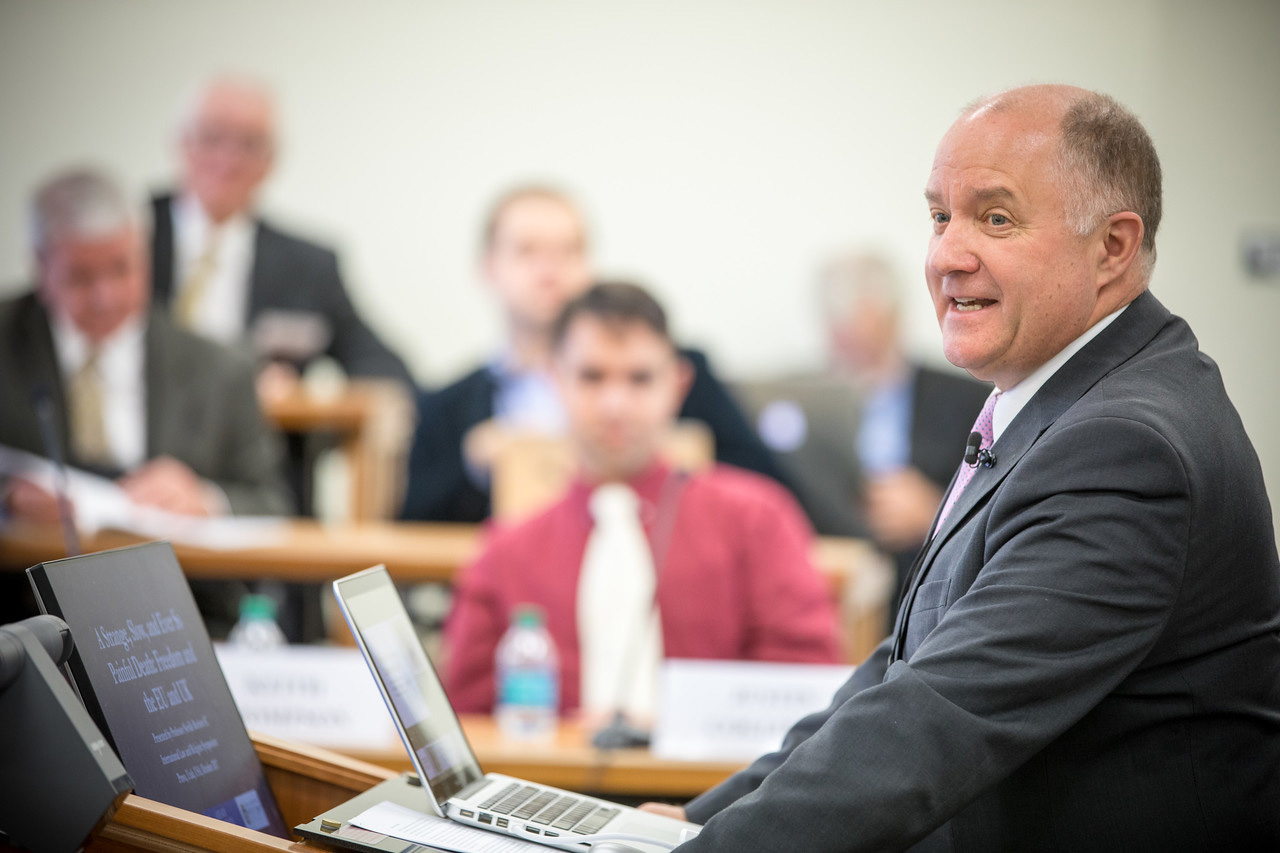
by Melissa Hartman, BYU Law Student and Symposium Volunteer
The breakout session on Comparative Legal Protections of Religious Freedom in a Changing World was held Tuesday, October 3, 2017 and moderated by Justin Collings, Associate Professor of Law at Brigham Young University’s J. Reuben Clark Law School. It included panelists, Neville G. Rochow, Barrister and Professor of Law at Notre Dame Australia and the University of Adelaide, and Keith Thompson, Associate Professor of Law at the School of Law at the University of Notre Dame Sydney.
Professor Rochow contended that by a number of political and legal mechanisms, religions are being closed…
Symposium 2017: Indonesia
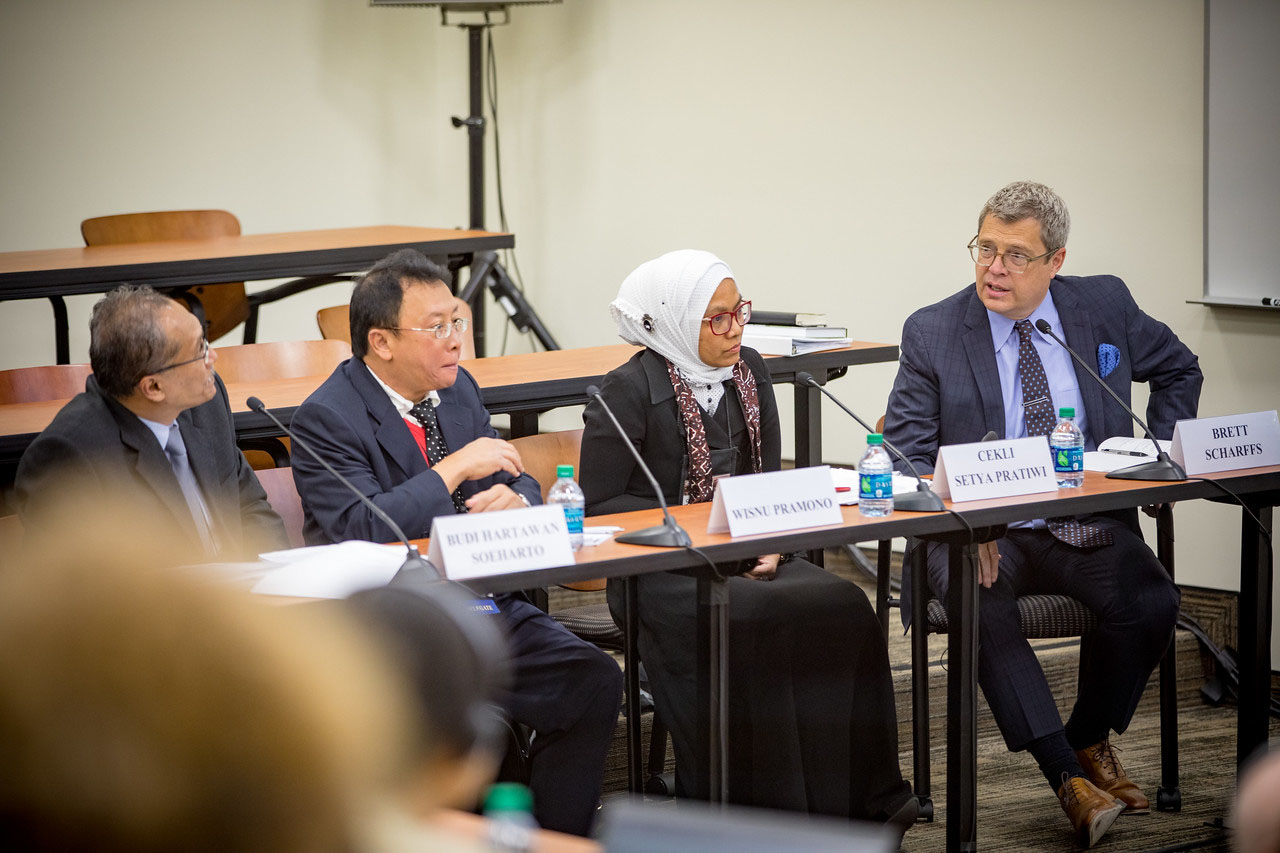
by Justin Miller, Symposium Executive Committee Member and BYU Law Student
Brett Scharffs, Director of the International Center for Law and Religion Studies at the BYU Law School moderated the Tuesday afternoon breakouts session on Indonesia. The panelists were Budi Hartawan Soeharto, Secretary of Directorate General of Labor Inspection and Occupational Safety and Health, Ministry of Manpower of the Republic of Indonesia; Wisnu Pramono, Director of Foreign Worker’s Placement, Ministry of Manpower; and Cekli S. Pratiwi, Lecturer, Faculty of Law, Universitas Muhammadiyah Malang. They discussed the situation of Freedom of Religion or Belief (FoRB) in Indonesia.
Between 2010 and 2015, while government…
2017 Symposium: Myanmar
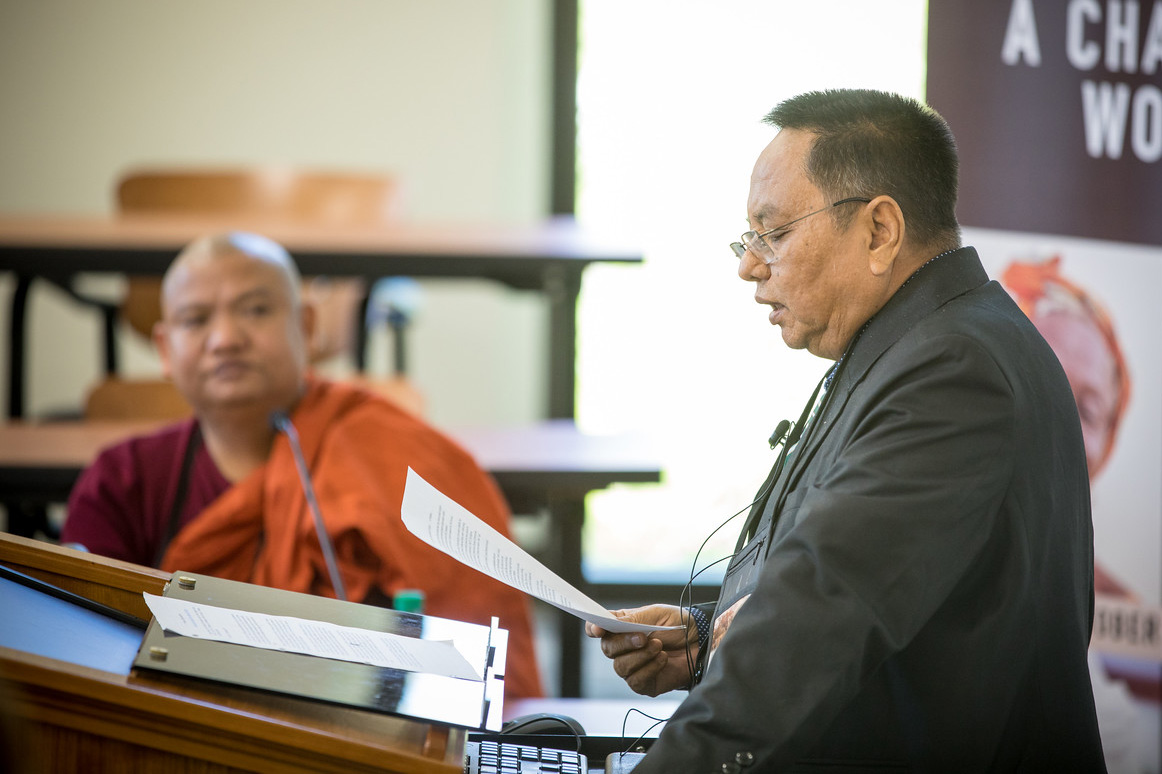
by Joshua Prince, BYU Law Student and Symposium Volunteer
At 2:00 PM on Tuesday, October 3, 2017, the International Center for Law and Religion Studies hosted a session on religious freedom issues from Myanmar. Sutacara Lankara, a professor at the Sitagu International Buddhist Academy in Myanmar, began the session and presented some remarks on how the “spirit of tolerance and mutual understanding” are necessary for religious freedom to flourish. These values have, “from the very beginning” been necessary for the furtherance of freedom and lead to a reduction of “prejudice in men’s minds.” It is this reduction that is necessary if men are to be “allowed to choose his freedom according to his own…
2017 Symposium: Fourth Plenary: Conference Summation and Concluding Reflections on Conference Themes
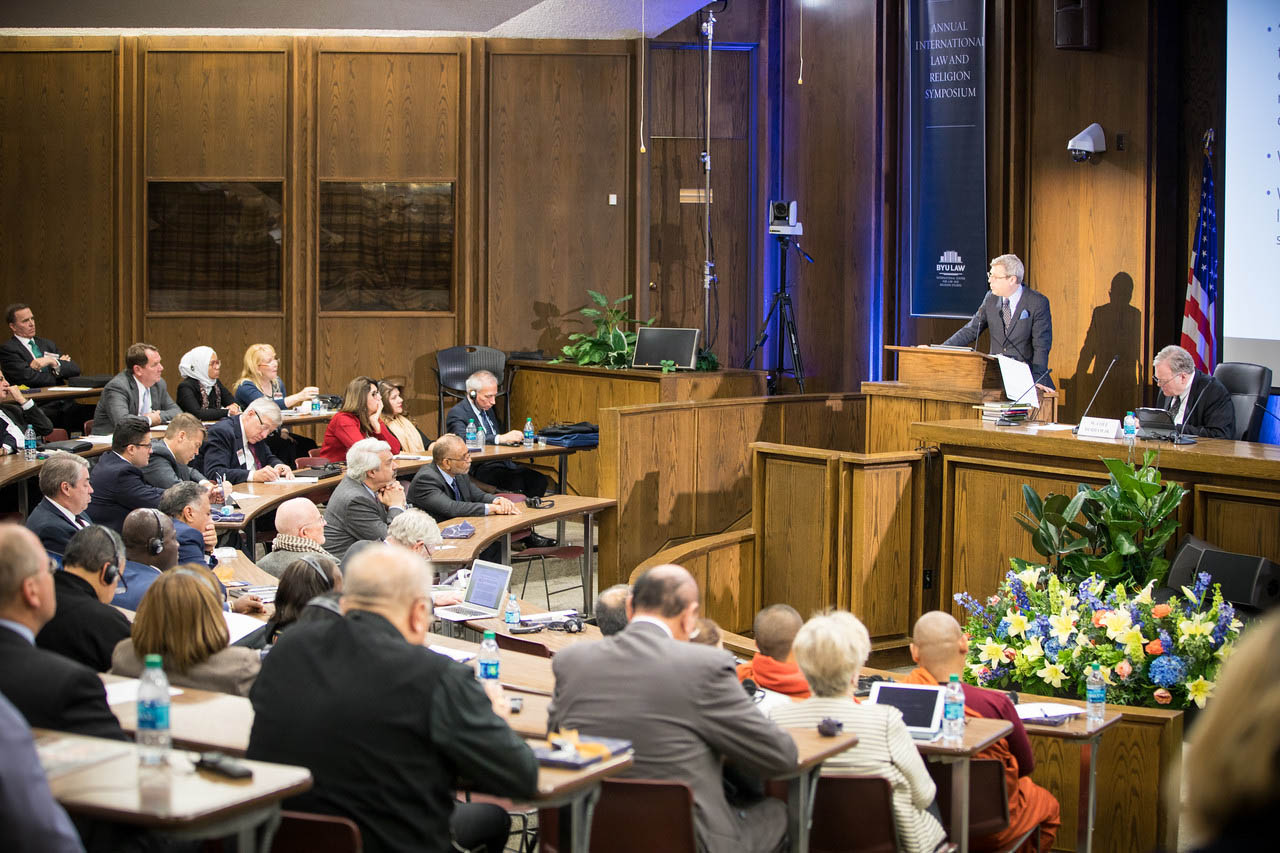
by Thomas Palmer, BYU Law Student and Symposium Volunteer
The fourth and final plenary of the 2017 Symposium was held on Tuesday afternoon, October 3, 2017. The session was opened by Brett Scharffs, Director of the International Center for Law and Religion Studies.
Professor Scharffs began by noting publications that were recently published by Symposium attendees.
He then presented on the topic “Are Human Rights a Western concept?” Professor Scharffs explained that the Universal Declaration of Human Rights (UDHR) was a revolutionary transformation in international law, because for the first time, human beings became subjects of international law. He examined some of the reasons why human rights are criticized as being merely a western concept. He then discussed the drafting of the UDHR, which included a diverse array of countries from throughout the world. He continued by discussing the universal guarantees discussed…